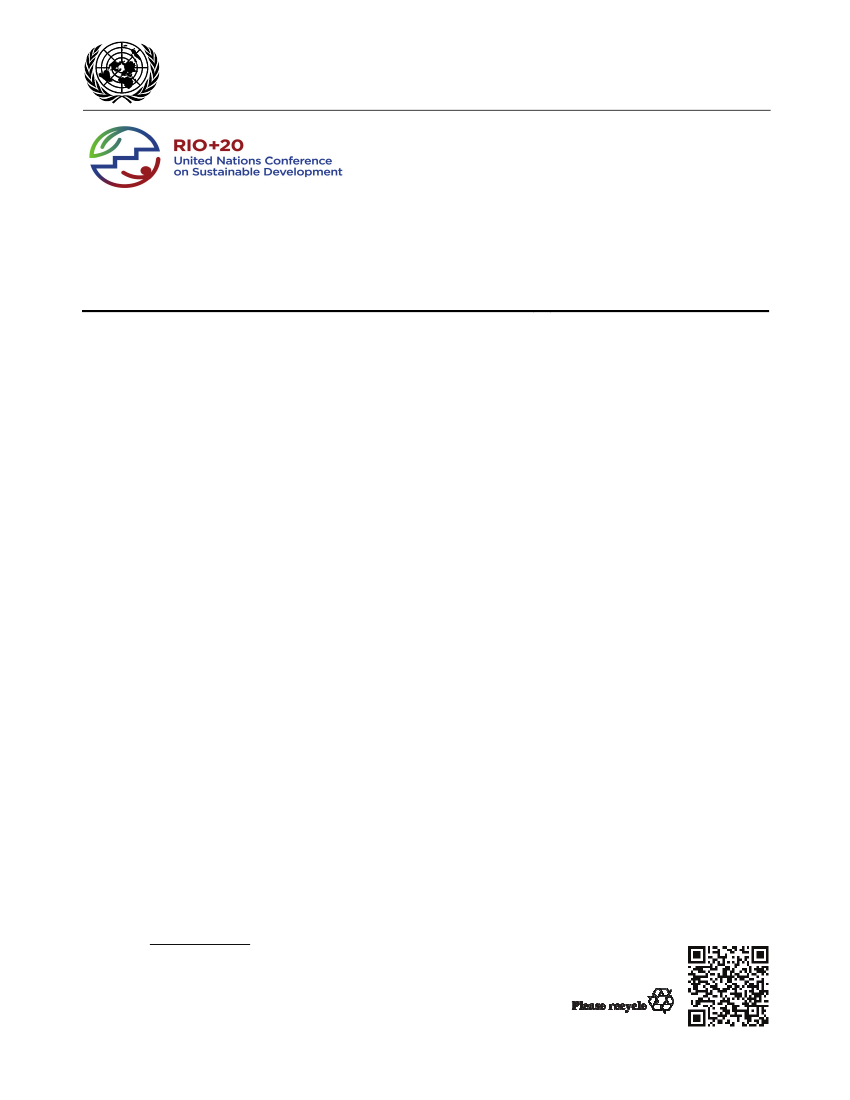Udvalget for Landdistrikter og Øer 2011-12
ULØ Alm.del Bilag 187
Offentligt
United NationsDistr.: Limited19 June 2012
A/CONF.216/L.1*
Original: EnglishRio de Janeiro, Brazil20-22 June 2012
Agenda item 10Outcome of the Conference
The future we wantI. Our common vision1.We, the Heads of State and Government and high-level representatives, havingmet at Rio de Janeiro, Brazil, from 20 to 22 June 2012, with the full participation ofcivil society, renew our commitment to sustainable development and to ensuring thepromotion of an economically, socially and environmentally sustainable future forour planet and for present and future generations.2.Eradicating poverty is the greatest global challenge facing the world today andan indispensable requirement for sustainable development. In this regard we arecommitted to freeing humanity from poverty and hunger as a matter of urgency.3.We therefore acknowledge the need to further mainstream sustainabledevelopment at all levels, integrating economic, social and environmental aspectsand recognizing their interlinkages, so as to achieve sustainable development in allits dimensions.4.We recognize that poverty eradication, changing unsustainable and promotingsustainable patterns of consumption and production and protecting and managingthe natural resource base of economic and social development are the overarchingobjectives of and essential requirements for sustainable development. We alsoreaffirm the need to achieve sustainable development by promoting sustained,inclusive and equitable economic growth, creating greater opportunities for all,reducing inequalities, raising basic standards of living, fostering equitable socialdevelopment and inclusion, and promoting integrated and sustainable managementof natural resources and ecosystems that supports, inter alia, economic, social andhuman development while facilitating ecosystem conservation, regeneration andrestoration and resilience in the face of new and emerging challenges.5.We reaffirm our commitment to make every effort to accelerate theachievement of the internationally agreed development goals, including theMillennium Development Goals by 2015.
* Reissued for technical reasons on 22 June 2012.
12-38164* (E) 220612
*1238164*
A/CONF.216/L.1
6.We recognize that people are at the centre of sustainable development and inthis regard we strive for a world that is just, equitable and inclusive, and we committo work together to promote sustained and inclusive economic growth, socialdevelopment and environmental protection and thereby to benefit all.7.We reaffirm that we continue to be guided by the purposes and principles ofthe Charter of the United Nations, with full respect for international law and itsprinciples.8.We also reaffirm the importance of freedom, peace and security, respect for allhuman rights, including the right to development and the right to an adequatestandard of living, including the right to food, the rule of law, gender equality, theempowerment of women and the overall commitment to just and democraticsocieties for development.9.We reaffirm the importance of the Universal Declaration of Human Rights, aswell as other international instruments relating to human rights and internationallaw. We emphasize the responsibilities of all States, in conformity with the Charterof the United Nations, to respect, protect and promote human rights andfundamental freedoms for all, without distinction of any kind as to race, colour, sex,language, religion, political or other opinion, national or social origin, property,birth, disability or other status.10. We acknowledge that democracy, good governance and the rule of law, at thenational and international levels, as well as an enabling environment, are essentialfor sustainable development, including sustained and inclusive economic growth,social development, environmental protection and the eradication of poverty andhunger. We reaffirm that to achieve our sustainable development goals we needinstitutions at all levels that are effective, transparent, accountable and democratic.11. We reaffirm our commitment to strengthen international cooperation to addressthe persistent challenges related to sustainable development for all, in particular indeveloping countries. In this regard, we reaffirm the need to achieve economicstability, sustained economic growth, promotion of social equity and protection ofthe environment, while enhancing gender equality, the empowerment of women andequal opportunities for all, and the protection, survival and development of childrento their full potential, including through education.12. We resolve to take urgent action to achieve sustainable development. Wetherefore renew our commitment to sustainable development, assessing the progressto date and the remaining gaps in the implementation of the outcomes of the majorsummits on sustainable development and addressing new and emerging challenges.We express our determination to address the themes of the United NationsConference on Sustainable Development, namely, a green economy in the context ofsustainable development and poverty eradication, and the institutional frameworkfor sustainable development.13. We recognize that opportunities for people to influence their lives and future,participate in decision-making and voice their concerns are fundamental forsustainable development. We underscore that sustainable development requiresconcrete and urgent action. It can only be achieved with a broad alliance of people,governments, civil society and the private sector, all working together to secure thefuture we want for present and future generations.
2
12-38164
A/CONF.216/L.1
II. Renewing political commitmentA.
Reaffirming the Rio Principles and past action plans
14. We recall the Stockholm Declaration of the United Nations Conference on theHuman Environment adopted at Stockholm on 16 June 1972.15. We reaffirm all the principles of the Rio Declaration on Environment andDevelopment, including, inter alia, the principle of common but differentiatedresponsibilities, as set out in principle 7 of the Rio Declaration.16. We reaffirm our commitment to fully implement the Rio Declaration onEnvironment and Development, Agenda 21, the Programme for the FurtherImplementation of Agenda 21, the Plan of Implementation of the World Summit onSustainable Development (Johannesburg Plan of Implementation) and theJohannesburg Declaration on Sustainable Development of the World Summit onSustainable Development, the Programme of Action for the SustainableDevelopment of Small Island Developing States (Barbados Programme of Action)and the Mauritius Strategy for the Further Implementation of the Programme ofAction for the Sustainable Development of Small Island Developing States. We alsoreaffirm our commitment to the full implementation of the Programme of Action forthe Least Developed Countries for the Decade 2011-2020 (Istanbul Programme ofAction), the Almaty Programme of Action: Addressing the Needs of LandlockedDeveloping Countries within a New Global Framework for Transit TransportCooperation for Landlocked and Transit Developing Countries, the politicaldeclaration on Africa’s development needs, and the New Partnership for Africa’sDevelopment. We recall as well our commitments in the outcomes of all the majorUnited Nations conferences and summits in the economic, social and environmentalfields, including the United Nations Millennium Declaration, the 2005 WorldSummit Outcome, the Monterrey Consensus of the International Conference onFinancing for Development, the Doha Declaration on Financing for Development,the outcome document of the High-level Plenary Meeting of the General Assemblyon the Millennium Development Goals, the Programme of Action of theInternational Conference on Population and Development, the key actions for thefurther implementation of the Programme of Action of the International Conferenceon Population and Development and the Beijing Declaration and Platform forAction.17. We recognize the importance of the three Rio conventions for advancingsustainable development and in this regard we urge all parties to fully implementtheir commitments under the United Nations Framework Convention on ClimateChange, the Convention on Biological Diversity and the United Nations Conventionto Combat Desertification in Those Countries Experiencing Serious Drought and/orDesertification, Particularly in Africa, in accordance with their respective principlesand provisions, as well as to take effective and concrete actions and measures at alllevels and to enhance international cooperation.18. We are determined to reinvigorate political will and to raise the level ofcommitment by the international community to move the sustainable developmentagenda forward, through the achievement of the internationally agreed developmentgoals, including the Millennium Development Goals. We further reaffirm ourrespective commitments to other relevant internationally agreed goals in the
12-38164
3
A/CONF.216/L.1
economic, social and environmental fields since 1992. We therefore resolve to takeconcrete measures that accelerate implementation of sustainable developmentcommitments.
Advancing integration, implementation and coherence: assessing
the progress to date and the remaining gaps in the implementation
of the outcomes of the major summits on sustainable development
and addressing new and emerging challenges
19. We recognize that the 20 years since the United Nations Conference onEnvironment and Development in 1992 have seen uneven progress, including insustainable development and poverty eradication. We emphasize the need to makeprogress in implementing previous commitments. We also recognize the need toaccelerate progress in closing development gaps between developed and developingcountries, and to seize and create opportunities to achieve sustainable developmentthrough economic growth and diversification, social development andenvironmental protection. To this end, we underscore the continued need for anenabling environment at the national and international levels, as well as continuedand strengthened international cooperation, particularly in the areas of finance, debt,trade and technology transfer, as mutually agreed, and innovation, entrepreneurship,capacity-building, transparency and accountability. We recognize the diversificationof actors and stakeholders engaged in the pursuit of sustainable development. In thiscontext, we affirm the continued need for the full and effective participation of allcountries, in particular developing countries, in global decision-making.20. We acknowledge that since 1992 there have been areas of insufficient progressand setbacks in the integration of the three dimensions of sustainable development,aggravated by multiple financial, economic, food and energy crises, which havethreatened the ability of all countries, in particular developing countries, to achievesustainable development. In this regard, it is critical that we do not backtrack fromour commitment to the outcome of the United Nations Conference on Environmentand Development. We also recognize that one of the current major challenges for allcountries, particularly for developing countries, is the impact from the multiplecrises affecting the world today.21. We are deeply concerned that one in five people on this planet, or over1 billion people, still live in extreme poverty, and that one in seven — or 14 percent — is undernourished, while public health challenges, including pandemics andepidemics, remain omnipresent threats. In this context, we note the ongoingdiscussions on human security in the General Assembly. We acknowledge that withthe world’s population projected to exceed 9 billion by 2050 with an estimated twothirds living in cities, we need to increase our efforts to achieve sustainabledevelopment and, in particular, the eradication of poverty, hunger and preventablediseases.22. We recognize examples of progress in sustainable development at the regional,national, subnational and local levels. We note that efforts to achieve sustainabledevelopment have been reflected in regional, national and subnational policies andplans, and that Governments have strengthened their commitment to sustainabledevelopment since the adoption of Agenda 21 through legislation and institutions,4
12-38164
A/CONF.216/L.1
and the development and implementation of international, regional and subregionalagreements and commitments.23. We reaffirm the importance of supporting developing countries in their effortsto eradicate poverty and promote empowerment of the poor and people in vulnerablesituations, including removing barriers to opportunity, enhancing productivecapacity, developing sustainable agriculture and promoting full and productiveemployment and decent work for all, complemented by effective social policies,including social protection floors, with a view to achieving the internationallyagreed development goals, including the Millennium Development Goals.24. We express deep concern about the continuing high levels of unemploymentand underemployment, particularly among young people, and note the need forsustainable development strategies to proactively address youth employment at alllevels. In this regard, we recognize the need for a global strategy on youth andemployment building on the work of the International Labour Organization (ILO).25. We acknowledge that climate change is a cross-cutting and persistent crisisand express our concern that the scale and gravity of the negative impacts of climatechange affect all countries and undermine the ability of all countries, in particular,developing countries, to achieve sustainable development and the MillenniumDevelopment Goals and threaten the viability and survival of nations. Therefore weunderscore that combating climate change requires urgent and ambitious action, inaccordance with the principles and provisions of the United Nations FrameworkConvention on Climate Change.26. States are strongly urged to refrain from promulgating and applying anyunilateral economic, financial or trade measures not in accordance with internationallaw and the Charter of the United Nations that impede the full achievement ofeconomic and social development, particularly in developing countries.27. We reiterate our commitment, expressed in the Johannesburg Plan ofImplementation, the 2005 World Summit Outcome and the outcome document of theHigh-level Plenary Meeting of the General Assembly on the MillenniumDevelopment Goals of 2010, to take further effective measures and actions, inconformity with international law, to remove the obstacles to the full realization ofthe right of self-determination of peoples living under colonial and foreignoccupation, which continue to adversely affect their economic and socialdevelopment as well as their environment, are incompatible with the dignity andworth of the human person and must be combated and eliminated.28. We reaffirm that, in accordance with the Charter of the United Nations, thisshall not be construed as authorizing or encouraging any action against theterritorial integrity or political independence of any State.29. We resolve to take further effective measures and actions, in conformity withinternational law, to remove obstacles and constraints, strengthen support and meetthe special needs of people living in areas affected by complex humanitarianemergencies and in areas affected by terrorism.30. We recognize that many people, especially the poor, depend directly onecosystems for their livelihoods, their economic, social and physical well-being, andtheir cultural heritage. For this reason, it is essential to generate decent jobs andincomes that decrease disparities in standards of living in order to better meet
12-38164
5
A/CONF.216/L.1
people’s needs and promote sustainable livelihoods and practices and the sustainableuse of natural resources and ecosystems.31. We emphasize that sustainable development must be inclusive and people-centred, benefiting and involving all people, including youth and children. Werecognize that gender equality and the empowerment of women are important forsustainable development and our common future. We reaffirm our commitments toensure women’s equal rights, access and opportunities for participation andleadership in the economy, society and political decision-making.32. We recognize that each country faces specific challenges to achievesustainable development and we underscore the special challenges facing the mostvulnerable countries and in particular African countries, least developed countries,landlocked developing countries and small island developing States, as well as thespecific challenges facing the middle-income countries. Countries in situations ofconflict also need special attention.33. We reaffirm our commitment to take urgent and concrete action to address thevulnerability of small island developing States, including through the sustainedimplementation of the Barbados Programme of Action and the Mauritius Strategy,and underscore the urgency of finding additional solutions to the major challengesfacing small island developing States in a concerted manner so as to support them insustaining momentum realized in implementing the Barbados Programme of Actionand the Mauritius Strategy and achieving sustainable development.34. We reaffirm that the Istanbul Programme of Action outlines the priorities ofleast developed countries for sustainable development and defines a framework forrenewed and strengthened global partnership to implement them. We commit toassist the least developed countries with the implementation of the IstanbulProgramme of Action as well as in their efforts to achieve sustainable development.35. We recognize that more attention should be given to Africa and theimplementation of previously agreed commitments related to its development needsthat were made at major United Nations summits and conferences. We note that aidto Africa has increased in recent years. However, it still lags behind commitmentsthat were previously made. We underscore the key priority for the internationalcommunity of supporting Africa’s sustainable development efforts. In this regard,we recommit to fully implement the internationally agreed commitments related toAfrica’s development needs, particularly those contained in the United NationsMillennium Declaration, the United Nations Declaration on the New Partnership forAfrica’s Development, the Monterrey Consensus, the Johannesburg Plan ofImplementation and the 2005 World Summit Outcome, as well as the 2008 politicaldeclaration on Africa’s development needs.36. We recognize the serious constraints to achieving sustainable development inall its three dimensions in landlocked developing countries. In this regard, wereaffirm our commitment to address the special development needs and thechallenges faced by landlocked developing countries through the full, timely andeffective implementation of the Almaty Programme of Action as contained in thedeclaration on the midterm review of the Almaty Programme of Action.37. We recognize the progress made by middle-income countries in improving thewell-being of their people, as well as the specific development challenges they facein their efforts to eradicate poverty, reduce inequalities and achieve their
6
12-38164
A/CONF.216/L.1
development goals, including the Millennium Development Goals, and to achievesustainable development in a comprehensive manner integrating the economic,social and environmental dimensions. We reiterate that these efforts should beadequately supported by the international community, in various forms, taking intoaccount the needs and the capacity to mobilize domestic resources of thesecountries.38. We recognize the need for broader measures of progress to complement grossdomestic product in order to better inform policy decisions, and in this regard werequest the United Nations Statistical Commission, in consultation with relevantUnited Nations system entities and other relevant organizations, to launch aprogramme of work in this area building on existing initiatives.39. We recognize that planet Earth and its ecosystems are our home and that“Mother Earth” is a common expression in a number of countries and regions, andwe note that some countries recognize the rights of nature in the context of thepromotion of sustainable development. We are convinced that in order to achieve ajust balance among the economic, social and environmental needs of present andfuture generations, it is necessary to promote harmony with nature.40. We call for holistic and integrated approaches to sustainable development thatwill guide humanity to live in harmony with nature and lead to efforts to restore thehealth and integrity of the Earth’s ecosystem.41. We acknowledge the natural and cultural diversity of the world and recognizethat all cultures and civilizations can contribute to sustainable development.
Engaging major groups and other stakeholders
42. We reaffirm the key role of all levels of government and legislative bodies inpromoting sustainable development. We further acknowledge efforts and progressmade at the local and subnational levels, and recognize the important role that suchauthorities and communities can play in implementing sustainable development,including by engaging citizens and stakeholders and providing them with relevantinformation, as appropriate, on the three dimensions of sustainable development. Wefurther acknowledge the importance of involving all relevant decision makers in theplanning and implementation of sustainable development policies.43. We underscore that broad public participation and access to information andjudicial and administrative proceedings are essential to the promotion of sustainabledevelopment. Sustainable development requires the meaningful involvement andactive participation of regional, national and subnational legislatures and judiciaries,and all major groups: women, children and youth, indigenous peoples,non-governmental organizations, local authorities, workers and trade unions,business and industry, the scientific and technological community, and farmers, aswell as other stakeholders, including local communities, volunteer groups andfoundations, migrants and families as well as older persons and persons withdisabilities. In this regard, we agree to work more closely with the major groups andother stakeholders and encourage their active participation, as appropriate, inprocesses that contribute to decision-making, planning and implementation ofpolicies and programmes for sustainable development at all levels.12-38164
7
A/CONF.216/L.1
44. We acknowledge the role of civil society and the importance of enabling allmembers of civil society to be actively engaged in sustainable development. Werecognize that improved participation of civil society depends upon, inter alia,strengthening access to information and building civil society capacity and anenabling environment. We recognize that information and communicationstechnology is facilitating the flow of information between governments and thepublic. In this regard, it is essential to work towards improved access to informationand communications technology, especially broadband networks and services, andbridge the digital divide, recognizing the contribution of international cooperation inthis regard.45. We underscore that women have a vital role to play in achieving sustainabledevelopment. We recognize the leadership role of women and we resolve to promotegender equality and the empowerment of women and to ensure their full andeffective participation in sustainable development policies, programmes anddecision-making at all levels.46. We acknowledge that the implementation of sustainable development willdepend on the active engagement of both the public and the private sectors. Werecognize that the active participation of the private sector can contribute to theachievement of sustainable development, including through the important tool ofpublic-private partnerships. We support national regulatory and policy frameworksthat enable business and industry to advance sustainable development initiatives,taking into account the importance of corporate social responsibility. We call on theprivate sector to engage in responsible business practices, such as those promotedby the United Nations Global Compact.47. We acknowledge the importance of corporate sustainability reporting andencourage companies, where appropriate, especially publicly listed and largecompanies, to consider integrating sustainability information into their reportingcycle. We encourage industry, interested governments and relevant stakeholderswith the support of the United Nations system, as appropriate, to develop models forbest practice and facilitate action for the integration of sustainability reporting,taking into account experiences from already existing frameworks and payingparticular attention to the needs of developing countries, including for capacity-building.48. We recognize the important contribution of the scientific and technologicalcommunity to sustainable development. We are committed to working with andfostering collaboration among the academic, scientific and technologicalcommunity, in particular in developing countries, to close the technological gapbetween developing and developed countries and strengthen the science-policyinterface as well as to foster international research collaboration on sustainabledevelopment.49. We stress the importance of the participation of indigenous peoples in theachievement of sustainable development. We also recognize the importance of theUnited Nations Declaration on the Rights of Indigenous Peoples in the context ofglobal, regional, national and subnational implementation of sustainabledevelopment strategies.50. We stress the importance of the active participation of young people indecision-making processes, as the issues we are addressing have a deep impact on
8
12-38164
A/CONF.216/L.1
present and future generations, and as the contribution of children and youth is vitalto the achievement of sustainable development. We also recognize the need topromote intergenerational dialogue and solidarity by recognizing their views.51. We stress the importance of the participation of workers and trade unions inthe promotion of sustainable development. As the representatives of workingpeople, trade unions are important partners in facilitating the achievement ofsustainable development, in particular the social dimension. Information, educationand training on sustainability at all levels, including in the workplace, are key tostrengthening the capacity of workers and trade unions to support sustainabledevelopment.52. We recognize that farmers, including small-scale farmers and fisherfolk,pastoralists and foresters, can make important contributions to sustainabledevelopment through production activities that are environmentally sound, enhancefood security and the livelihood of the poor, and invigorate production and sustainedeconomic growth.53. We note the valuable contributions that non-governmental organizations couldand do make in promoting sustainable development through their well-establishedand diverse experience, expertise and capacity, especially in the area of analysis,sharing of information and knowledge, promotion of dialogue and support ofimplementation of sustainable development.54. We recognize the central role of the United Nations in advancing thesustainable development agenda. We acknowledge as well, in this regard, thecontributions of other relevant international organizations, including internationalfinancial institutions and multilateral development banks, and stress the importanceof cooperation among them and with the United Nations, within their respectivemandates, recognizing their role in mobilizing resources for sustainabledevelopment.55. We commit ourselves to reinvigorating the global partnership for sustainabledevelopment that we launched in Rio de Janeiro in 1992. We recognize the need toimpart new momentum to our cooperative pursuit of sustainable development, andcommit to work together with major groups and other stakeholders in addressingimplementation gaps.
III. Green economy in the context of sustainable developmentand poverty eradication56. We affirm that there are different approaches, visions, models and toolsavailable to each country, in accordance with its national circumstances andpriorities, to achieve sustainable development in its three dimensions which is ouroverarching goal. In this regard, we consider green economy in the context ofsustainable development and poverty eradication as one of the important toolsavailable for achieving sustainable development and that it could provide optionsfor policymaking but should not be a rigid set of rules. We emphasize that it shouldcontribute to eradicating poverty as well as sustained economic growth, enhancingsocial inclusion, improving human welfare and creating opportunities foremployment and decent work for all, while maintaining the healthy functioning ofthe Earth’s ecosystems.
12-38164
9
A/CONF.216/L.1
57. We affirm that policies for green economy in the context of sustainabledevelopment and poverty eradication should be guided by and in accordance with allthe Rio Principles, Agenda 21 and the Johannesburg Plan of Implementation andcontribute towards achieving relevant internationally agreed development goals,including the Millennium Development Goals.58. We affirm that green economy policies in the context of sustainabledevelopment and poverty eradication should:(a)Be consistent with international law;(b) Respect each country’s national sovereignty over their natural resourcestaking into account its national circumstances, objectives, responsibilities, prioritiesand policy space with regard to the three dimensions of sustainable development;(c) Be supported by an enabling environment and well-functioninginstitutions at all levels with a leading role for governments and with theparticipation of all relevant stakeholders, including civil society;(d) Promote sustained and inclusive economic growth, foster innovation andprovide opportunities, benefits and empowerment for all and respect of all humanrights;(e) Take into account the needs of developing countries, particularly those inspecial situations;(f) Strengthen international cooperation, including the provision of financialresources, capacity-building and technology transfer to developing countries;(g) Effectively avoid unwarranted conditionalities on official developmentassistance (ODA) and finance;(h) Not constitute a means of arbitrary or unjustifiable discrimination or adisguised restriction on international trade, avoid unilateral actions to deal withenvironmental challenges outside the jurisdiction of the importing country, andensure that environmental measures addressing transboundary or globalenvironmental problems, as far as possible, are based on an international consensus;(i) Contribute to closing technology gaps between developed and developingcountries and reduce the technological dependence of developing countries using allappropriate measures;(j) Enhance the welfare of indigenous peoples and their communities, otherlocal and traditional communities and ethnic minorities, recognizing and supportingtheir identity, culture and interests, and avoid endangering their cultural heritage,practices and traditional knowledge, preserving and respecting non-marketapproaches that contribute to the eradication of poverty;(k) Enhance the welfare of women, children, youth, persons with disabilities,smallholder and subsistence farmers, fisherfolk and those working in small andmedium-sized enterprises, and improve the livelihoods and empowerment of thepoor and vulnerable groups in particular in developing countries;(l) Mobilize the full potential and ensure the equal contribution of bothwomen and men;
10
12-38164
A/CONF.216/L.1
(m) Promote productive activities in developing countries that contribute tothe eradication of poverty;(n) Address the concern about inequalities and promote social inclusion,including social protection floors;(o)Promote sustainable consumption and production patterns;equitabledevelopment(p) Continue efforts to strive for inclusive,approaches to overcome poverty and inequality.
59. We view the implementation of green economy policies by countries that seekto apply them for the transition towards sustainable development as a commonundertaking, and we recognize that each country can choose an appropriateapproach in accordance with national sustainable development plans, strategies andpriorities.60. We acknowledge that green economy in the context of sustainabledevelopment and poverty eradication will enhance our ability to manage naturalresources sustainably and with lower negative environmental impacts, increaseresource efficiency and reduce waste.61. We recognize that urgent action on unsustainable patterns of production andconsumption where they occur remains fundamental in addressing environmentalsustainability and promoting conservation and sustainable use of biodiversity andecosystems, regeneration of natural resources and the promotion of sustained,inclusive and equitable global growth.62. We encourage each country to consider the implementation of green economypolicies in the context of sustainable development and poverty eradication, in amanner that endeavours to drive sustained, inclusive and equitable economic growthand job creation, particularly for women, youth and the poor. In this respect, wenote the importance of ensuring that workers are equipped with the necessary skills,including through education and capacity-building, and are provided with thenecessary social and health protections. In this regard, we encourage allstakeholders, including business and industry, to contribute, as appropriate. Weinvite governments to improve knowledge and statistical capacity on job trends,developments and constraints and integrate relevant data into national statistics,with the support of relevant United Nations agencies within their mandates.63. We recognize the importance of the evaluation of the range of social,environmental and economic factors and encourage, where national circumstancesand conditions allow, their integration into decision-making. We acknowledge that itwill be important to take into account the opportunities and challenges, as well asthe costs and benefits, of green economy policies in the context of sustainabledevelopment and poverty eradication, using the best available scientific data andanalysis. We acknowledge that a mix of measures, including regulatory, voluntaryand others applied at the national level and consistent with obligations underinternational agreements, could promote green economy in the context ofsustainable development and poverty eradication. We reaffirm that social policiesare vital to promoting sustainable development.64. We acknowledge that involvement of all stakeholders and their partnerships,networking and experience-sharing at all levels could help countries to learn fromone another in identifying appropriate sustainable development policies, including
12-38164
11
A/CONF.216/L.1
green economy policies. We note the positive experiences in some countries,including in developing countries, in adopting green economy policies in the contextof sustainable development and poverty eradication through an inclusive approachand welcome the voluntary exchange of experiences as well as capacity-building inthe different areas of sustainable development.65. We recognize the power of communications technologies, includingconnection technologies and innovative applications, to promote knowledgeexchange, technical cooperation and capacity-building for sustainable development.These technologies and applications can build capacity and enable the sharing ofexperiences and knowledge in the different areas of sustainable development in anopen and transparent manner.66. Recognizing the importance of linking financing, technology, capacity-building and national needs for sustainable development policies, including greeneconomy in the context of sustainable development and poverty eradication, weinvite the United Nations system, in cooperation with relevant donors andinternational organizations, to coordinate and provide information upon request on:(a) Matching interested countries with the partners that are best suited toprovide requested support;(b) Toolboxes and/or best practices in applying policies on green economy inthe context of sustainable development and poverty eradication at all levels;(c) Models or good examples of policies on green economy in the context ofsustainable development and poverty eradication;(d) Methodologies for evaluation of policies on green economy in thecontext of sustainable development and poverty eradication;(e)Existing and emerging platforms that contribute in this regard.67. We underscore the importance of governments taking a leadership role indeveloping policies and strategies through an inclusive and transparent process. Wealso take note of the efforts of those countries, including developing countries, thathave already initiated processes to prepare national green economy strategies andpolicies in support of sustainable development.68. We invite relevant stakeholders, including the United Nations regionalcommissions, United Nations organizations and bodies, other relevantintergovernmental and regional organizations, international financial institutions andmajor groups involved in sustainable development, according to their respectivemandates, to support developing countries upon request to achieve sustainabledevelopment, including through, inter alia, green economy policies in the context ofsustainable development and poverty eradication, in particular in least developedcountries.69. We also invite business and industry as appropriate and in accordance withnational legislation to contribute to sustainable development and to developsustainability strategies that integrate, inter alia, green economy policies.70. We acknowledge the role of cooperatives and microenterprises in contributingto social inclusion and poverty reduction in particular in developing countries.
12
12-38164
A/CONF.216/L.1
71. We encourage existing and new partnerships, including public-privatepartnerships, to mobilize public financing complemented by the private sector,taking into account the interests of local and indigenous communities whenappropriate. In this regard, governments should support initiatives for sustainabledevelopment, including promoting the contribution of the private sector to supportgreen economy policies in the context of sustainable development and povertyeradication.72. We recognize the critical role of technology as well as the importance ofpromoting innovation, in particular in developing countries. We invite governments,as appropriate, to create enabling frameworks that foster environmentally soundtechnology, research and development, and innovation, including in support of greeneconomy in the context of sustainable development and poverty eradication.73. We emphasize the importance of technology transfer to developing countriesand recall the provisions on technology transfer, finance, access to information, andintellectual property rights as agreed in the Johannesburg Plan of Implementation, inparticular its call to promote, facilitate and finance, as appropriate, access to and thedevelopment, transfer and diffusion of environmentally sound technologies andcorresponding know-how, in particular to developing countries, on favourableterms, including on concessional and preferential terms, as mutually agreed. We alsotake note of the further evolution of discussions and agreements on these issuessince the adoption of the Johannesburg Plan of Implementation.74. We recognize that the efforts of developing countries that choose to implementgreen economy policies in the context of sustainable development and povertyeradication should be supported through technical and technological assistance.
IV. Institutional framework for sustainable developmentA.
Strengthening the three dimensions of sustainable development
75. We underscore the importance of a strengthened institutional framework forsustainable development which responds coherently and effectively to current andfuture challenges and efficiently bridges gaps in the implementation of thesustainable development agenda. The institutional framework for sustainabledevelopment should integrate the three dimensions of sustainable development in abalanced manner and enhance implementation by, inter alia, strengtheningcoherence, coordination, avoiding duplication of efforts and reviewing progress inimplementing sustainable development. We also reaffirm that the framework shouldbe inclusive, transparent and effective and that it should find common solutionsrelated to global challenges to sustainable development.76. We recognize that effective governance at the local, subnational, national,regional and global levels representing the voices and interests of all is critical foradvancing sustainable development. The strengthening and reform of theinstitutional framework should not be an end in itself, but a means to achievesustainable development. We recognize that an improved and more effectiveinstitutional framework for sustainable development at the international level shouldbe consistent with the Rio Principles, build on Agenda 21 and the Johannesburg Planof Implementation and its objectives on the institutional framework for sustainable
12-38164
13
A/CONF.216/L.1
development, contribute to the implementation of our commitments in the outcomesof United Nations conferences and summits in the economic, social, environmentaland related fields and take into account national priorities and the developmentstrategies and priorities of developing countries. We therefore resolve to strengthenthe institutional framework for sustainable development, which will, inter alia:(a) Promote the balanced integration of the three dimensions of sustainabledevelopment;(b) Be based on an action- and result-oriented approach giving due regard toall relevant cross-cutting issues with the aim to contribute to the implementation ofsustainable development;(c) Underscore the importance of interlinkages among key issues andchallenges and the need for a systematic approach to them at all relevant levels;(d) Enhance coherence, reduce fragmentation and overlap and increaseeffectiveness, efficiency and transparency, while reinforcing coordination andcooperation;(e) Promote full and effective participation of all countries in decision-making processes;(f) Engage high-level political leaders, provide policy guidance and identifyspecific actions to promote effective implementation of sustainable development,including through voluntary sharing of experiences and lessons learned;(g) Promote the science-policy interface through inclusive, evidence-basedand transparent scientific assessments, as well as access to reliable, relevant andtimely data in areas related to the three dimensions of sustainable development,building on existing mechanisms, as appropriate; in this regard, strengthenparticipation of all countries in international sustainable development processes andcapacity-building especially for developing countries, including in conducting theirown monitoring and assessments;(h) Enhance the participation and effective engagement of civil society andother relevant stakeholders in the relevant international forums and in this regardpromote transparency and broad public participation and partnerships to implementsustainable development;(i) Promote the review and stocktaking of progress in the implementation ofall sustainable development commitments, including commitments related to meansof implementation.
Strengthening intergovernmental arrangements for
sustainable development
77. We acknowledge the vital importance of an inclusive, transparent, reformed,strengthened and effective multilateral system in order to better address the urgentglobal challenges of sustainable development today, recognizing the universalityand central role of the United Nations and reaffirming our commitment to promoteand strengthen the effectiveness and efficiency of the United Nations system.78. We underscore the need to strengthen United Nations system-wide coherenceand coordination, while ensuring appropriate accountability to Member States, by,14
12-38164
A/CONF.216/L.1
inter alia, enhancing coherence in reporting and reinforcing cooperative effortsunder existing inter-agency mechanisms and strategies to advance the integration ofthe three dimensions of sustainable development within the United Nations system,including through exchange of information among its agencies, funds andprogrammes, and also with the international financial institutions and other relevantorganizations such as the World Trade Organization (WTO), within their respectivemandates.79. We emphasize the need for an improved and more effective institutionalframework for sustainable development which should be guided by the specificfunctions required and mandates involved; address the shortcomings of the currentsystem; take into account all relevant implications; promote synergies andcoherence; seek to avoid duplication and eliminate unnecessary overlaps within theUnited Nations system; and reduce administrative burdens and build on existingarrangements.General Assembly80. We reaffirm the role and authority of the General Assembly on global mattersof concern to the international community, as set out in the Charter.81. We further reaffirm the central position of the General Assembly as the chiefdeliberative, policymaking and representative organ of the United Nations. In thisregard, we call for the Assembly to further integrate sustainable development as akey element of the overarching framework for United Nations activities andadequately address sustainable development in its agenda setting, including throughperiodic high-level dialogues.Economic and Social Council82. We reaffirm that the Economic and Social Council is a principal body forpolicy review, policy dialogue and recommendations on issues of economic andsocial development and for the follow-up to the Millennium Development Goals andis a central mechanism for the coordination of the United Nations system andsupervision of the subsidiary bodies of the Council, in particular its functionalcommissions, and for promoting the implementation of Agenda 21 by strengtheningsystem-wide coherence and coordination. We also reaffirm the major role theCouncil plays in the overall coordination of funds, programmes and specializedagencies, ensuring coherence among them and avoiding duplication of mandates andactivities.83. We commit to strengthen the Economic and Social Council within its mandateunder the Charter, as a principal organ in the integrated and coordinated follow-upof the outcomes of all major United Nations conferences and summits in theeconomic, social, environmental and related fields, and recognize its key role inachieving a balanced integration of the three dimensions of sustainabledevelopment. We look forward to the review of the implementation of GeneralAssembly resolution 61/16 on the strengthening of the Economic and SocialCouncil.
12-38164
15
A/CONF.216/L.1
High-level political forum84. We decide to establish a universal intergovernmental high-level politicalforum, building on the strengths, experiences, resources and inclusive participationmodalities of the Commission on Sustainable Development, and subsequentlyreplacing the Commission. The high-level political forum shall follow up on theimplementation of sustainable development and should avoid overlap with existingstructures, bodies and entities in a cost-effective manner.85.The high-level forum could:leadership,guidanceandrecommendationsfor(a) Provide politicalsustainable development;
(b) Enhance integration of the three dimensions of sustainable developmentin a holistic and cross-sectoral manner at all levels;(c) Provide a dynamic platform for regular dialogue, and for stocktaking andagenda setting to advance sustainable development;(d) Have a focused, dynamic and action-oriented agenda, ensuring theappropriate consideration of new and emerging sustainable development challenges;(e) Follow up and review progress in the implementation of sustainabledevelopment commitments contained in Agenda 21, the Johannesburg Plan ofImplementation, the Barbados Programme of Action, the Mauritius Strategy and theoutcome of the present Conference and, as appropriate, relevant outcomes of otherUnited Nations summits and conferences, including the outcome of the FourthUnited Nations Conference on the Least Developed Countries, as well as theirrespective means of implementation;(f) Encourage high-level system-wide participation of United Nationsagencies, funds and programmes and invite to participate, as appropriate, otherrelevant multilateral financial and trade institutions and treaty bodies, within theirrespective mandates and in accordance with United Nations rules and provisions;(g) Improve cooperation and coordination within the United Nations systemon sustainable development programmes and policies;(h) Promote transparency and implementation through further enhancing theconsultative role and participation of major groups and other relevant stakeholdersat the international level in order to better make use of their expertise, whileretaining the intergovernmental nature of discussions;(i) Promote the sharing of best practices and experiences relating to theimplementation of sustainable development and, on a voluntary basis, facilitatesharing of experiences, including successes, challenges and lessons learned;(j) Promote system-wide coherence and coordination of sustainabledevelopment policies;(k) Strengthen the science-policy interface through review of documentationbringing together dispersed information and assessments, including in the form of aglobal sustainable development report, building on existing assessments;
16
12-38164
A/CONF.216/L.1
(l) Enhance evidence-based decision-making at all levels and contribute tostrengthening ongoing efforts of capacity-building for data collection and analysis indeveloping countries.86. We decide to launch an intergovernmental and open, transparent and inclusivenegotiation process under the General Assembly to define the format andorganizational aspects of the high-level forum with the aim of convening the firsthigh-level forum at the beginning of the sixty-eighth session of the Assembly. Wewill also consider the need for promoting intergenerational solidarity for theachievement of sustainable development, taking into account the needs of futuregenerations, including by inviting the Secretary-General to present a report on thisissue.
Environmental pillar in the context of sustainable development
87. We reaffirm the need to strengthen international environmental governancewithin the context of the institutional framework for sustainable development, inorder to promote a balanced integration of the economic, social and environmentaldimensions of sustainable development as well as coordination within the UnitedNations system.88. We are committed to strengthening the role of the United Nations EnvironmentProgramme (UNEP) as the leading global environmental authority that sets theglobal environmental agenda, promotes the coherent implementation of theenvironmental dimension of sustainable development within the United Nationssystem and serves as an authoritative advocate for the global environment. Wereaffirm resolution 2997 (XXVII) of 15 December 1972 which established UNEPand other relevant resolutions that reinforce its mandate, as well as the 1997 NairobiDeclaration on the Role and Mandate of UNEP and the 2000 Malmö MinisterialDeclaration. In this regard, we invite the General Assembly, at its sixty-seventhsession, to adopt a resolution strengthening and upgrading UNEP in the followingmanner:(a) Establish universal membership in the Governing Council of UNEP, aswell as other measures to strengthen its governance as well its responsiveness andaccountability to Member States;(b) Have secure, stable, adequate and increased financial resources from theregular budget of the United Nations and voluntary contributions to fulfil itsmandate;(c) Enhance the voice of UNEP and its ability to fulfil its coordinationmandate within the United Nations system by strengthening UNEP engagement inkey United Nations coordination bodies and empowering UNEP to lead efforts toformulate United Nations system-wide strategies on the environment;(d) Promote a strong science-policy interface, building on existinginternational instruments, assessments, panels and information networks, includingthe Global Environment Outlook, as one of the processes aimed at bringing togetherinformation and assessment to support informed decision-making;(e) Disseminate and share evidence-based environmental information andraise public awareness on critical as well as emerging environmental issues;12-38164
17
A/CONF.216/L.1
(f) Provide capacity-building to countries, as well as support and facilitateaccess to technology;(g) Progressively consolidate headquarters functions in Nairobi, as well asstrengthen its regional presence, in order to assist countries, upon request, in theimplementation of their national environmental policies, collaborating closely withother relevant entities of the United Nations system;(h) Ensure the active participation of all relevant stakeholders drawing onbest practices and models from relevant multilateral institutions and exploring newmechanisms to promote transparency and the effective engagement of civil society.89. We recognize the significant contributions to sustainable development made bythe multilateral environmental agreements. We acknowledge the work alreadyundertaken to enhance synergies among the three conventions in the chemicals andwaste cluster (the Basel Convention on the Control of Transboundary Movements ofHazardous Wastes and their Disposal, the Rotterdam Convention on the PriorInformed Consent Procedure for Certain Hazardous Chemicals and Pesticides inInternational Trade and the Stockholm Convention on Persistent OrganicPollutants). We encourage parties to multilateral environmental agreements toconsider further measures, in these and other clusters, as appropriate, to promotepolicy coherence at all relevant levels, improve efficiency, reduce unnecessaryoverlap and duplication, and enhance coordination and cooperation among themultilateral environmental agreements, including the three Rio conventions, as wellas with the United Nations system in the field.90. We stress the need for the continuation of a regular review of the state of theEarth’s changing environment and its impact on human well-being and, in thisregard, we welcome such initiatives as the Global Environment Outlook processaimed at bringing together environmental information and assessments and buildingnational and regional capacity to support informed decision-making.
International financial institutions and United Nations
operational activities
91. We recognize that sustainable development should be given due considerationby the programmes, funds and specialized agencies of the United Nations systemand other relevant entities such as international financial institutions and the UnitedNations Conference on Trade and Development, in accordance with their respectiveexisting mandates. In this regard, we invite them to further enhance mainstreamingof sustainable development in their respective mandates, programmes, strategies anddecision-making processes, in support of the efforts of all countries, in particulardeveloping countries, in the achievement of sustainable development.92. We reaffirm the importance of broadening and strengthening the participationof developing countries in international economic decision-making and norm-setting, and in this regard, take note of recent important decisions on reform of thegovernance structures, quotas and voting rights of the Bretton Woods institutions,better reflecting current realities and enhancing the voice and participation ofdeveloping countries, and reiterate the importance of the reform of the governanceof those institutions in order to deliver more effective, credible, accountable andlegitimate institutions.18
12-38164
A/CONF.216/L.1
93. We call for the further mainstreaming of the three dimensions of sustainabledevelopment throughout the United Nations system, and request the Secretary-General to report to the General Assembly, through the Economic and SocialCouncil, on the progress made in this regard. We also call for and recognize theimportance of the strengthening of policy coordination within key structures of theSecretariat of the United Nations so as to ensure system-wide coherence in supportof sustainable development, while ensuring accountability to Member States.94. We invite the governing bodies of the funds, programmes and specializedagencies of the United Nations development system to consider appropriatemeasures for integrating the social, economic and environmental dimensions acrossthe operational activities of the United Nations system. We also emphasize thatincreasing the financial contributions to the United Nations development system iskey to achieving the internationally agreed development goals, including theMillennium Development Goals, and in this regard we recognize the mutuallyreinforcing links among increased effectiveness, efficiency and coherence of theUnited Nations development system, achieving concrete results in assistingdeveloping countries in eradicating poverty and achieving sustained economicgrowth and sustainable development.95. We emphasize the need to strengthen operational activities for development ofthe United Nations system in the field that are well aligned with national sustainabledevelopment priorities of developing countries. In this regard, we emphasize thatthe fundamental characteristics and principles of United Nations operationalactivities set forth in the relevant General Assembly resolutions provide theoverarching framework for all matters pertaining to the United Nations developmentassistance operations in the field. We recognize the importance of strengtheningUnited Nations system coordination. We look forward to receiving the outcome ofthe independent evaluation of the Delivering as one initiative.96. We call on the United Nations system to improve the management of facilitiesand operations, by taking into account sustainable development practices, buildingon existing efforts and promoting cost effectiveness, and in accordance withlegislative frameworks, including financial rules and regulations, while maintainingaccountability to Member States.
Regional, national, subnational and local levels
97. We acknowledge the importance of the regional dimension of sustainabledevelopment. Regional frameworks can complement and facilitate effectivetranslation of sustainable development policies into concrete action at the nationallevel.98. We encourage regional, national, subnational and local authorities asappropriate to develop and utilize sustainable development strategies as keyinstruments for guiding decision-making and implementation of sustainabledevelopment at all levels, and in this regard we recognize that integrated social,economic and environmental data and information, as well as effective analysis andassessment of implementation, is important in decision-making processes.12-38164
19
A/CONF.216/L.1
99. We encourage action at the regional, national, subnational and local levels topromote access to information, public participation and access to justice inenvironmental matters, as appropriate.100. We emphasize that regional and subregional organizations, including theUnited Nations regional commissions and their subregional offices, have asignificant role to play in promoting a balanced integration of the economic, socialand environmental dimensions of sustainable development in their respectiveregions. We underscore the need to support these institutions, including through theUnited Nations system, in the effective operationalization and implementation ofsustainable development, and to facilitate institutional coherence and harmonizationof relevant development policies, plans and programmes. In this regard, we urgethese institutions to prioritize sustainable development through, inter alia, moreefficient and effective capacity-building, development and implementation ofregional agreements and arrangements as appropriate, and exchange of information,best practices and lessons learned. We also welcome regional and cross-regionalinitiatives for sustainable development. We furthermore recognize the need toensure effective linkage among global, regional, subregional and national processesto advance sustainable development. We encourage the enhancement of the UnitedNations regional commissions and their subregional offices in their respectivecapacities to support Member States in implementing sustainable development.101. We underline the need for more coherent and integrated planning and decision-making at the national, subnational and local levels as appropriate and, to this end,we call on countries to strengthen national, subnational and/or local institutions orrelevant multi-stakeholder bodies and processes, as appropriate, dealing withsustainable development, including to coordinate on matters of sustainabledevelopment and to enable effective integration of the three dimensions ofsustainable development.102. We welcome regional and cross-regional initiatives for sustainabledevelopment, such as the Green Bridge Partnership Programme, which is voluntaryand open for participation by all partners.103. We underscore the need to ensure long-term political commitment tosustainable development taking into account national circumstances and prioritiesand, in this regard, we encourage all countries to undertake the necessary actionsand measures to achieve sustainable development.
V. Framework for action and follow-upA.
Thematic areas and cross-sectoral issues
104. We recognize that in order to achieve the objective of the Conference, namelyto secure renewed political commitment for sustainable development, as well as toaddress the themes of a green economy in the context of sustainable developmentand poverty eradication and the institutional framework for sustainabledevelopment, we commit to address remaining gaps in the implementation of theoutcomes of the major summits on sustainable development, to address new andemerging challenges and to seize new opportunities through the actions enumeratedbelow in this framework for action, supported as appropriate through provision of
20
12-38164
A/CONF.216/L.1
means of implementation. We recognize that goals, targets and indicators, includingwhere appropriate gender-sensitive indicators, are valuable in measuring andaccelerating progress. We further note that progress in the implementation of theactions stipulated below can be enhanced by voluntarily sharing information,knowledge and experience.Poverty eradication105. We recognize that, three years from the 2015 target date of the MillenniumDevelopment Goals, while there has been progress in reducing poverty in someregions, this progress has been uneven and the number of people living in poverty insome countries continues to increase, with women and children constituting themajority of the most affected groups, especially in the least developed countries andparticularly in Africa.106. We recognize that sustained, inclusive and equitable economic growth indeveloping countries is a key requirement for eradicating poverty and hunger andachieving the Millennium Development Goals. In this regard, we emphasize thatnational efforts of developing countries should be complemented by an enablingenvironment aimed at expanding the development opportunities of developingcountries. We also emphasize the need to accord the highest priority to povertyeradication within the United Nations development agenda, addressing the rootcauses and challenges of poverty through integrated, coordinated and coherentstrategies at all levels.107. We recognize that promoting universal access to social services can make animportant contribution to consolidating and achieving development gains. Socialprotection systems that address and reduce inequality and social exclusion areessential for eradicating poverty and advancing the achievement of the MillenniumDevelopment Goals. In this regard, we strongly encourage initiatives aimed atenhancing social protection for all people.Food security and nutrition and sustainable agriculture108. We reaffirm our commitments regarding the right of everyone to have accessto safe, sufficient and nutritious food, consistent with the right to adequate food andthe fundamental right of everyone to be free from hunger. We acknowledge thatfood security and nutrition has become a pressing global challenge and, in thisregard, we further reaffirm our commitment to enhancing food security and accessto adequate, safe and nutritious food for present and future generations in line withthe Five Rome Principles for Sustainable Global Food Security adopted in 2009,including for children under two, and through, as appropriate, national, regional andglobal food security and nutrition strategies.109. We recognize that a significant portion of the world’s poor live in rural areas,and that rural communities play an important role in the economic development ofmany countries. We emphasize the need to revitalize the agricultural and ruraldevelopment sectors, notably in developing countries, in an economically, sociallyand environmentally sustainable manner. We recognize the importance of taking thenecessary actions to better address the needs of rural communities through, interalia, enhancing access by agricultural producers, in particular small producers,women, indigenous peoples and people living in vulnerable situations, to credit andother financial services, markets, secure land tenure, health care, social services,
12-38164
21
A/CONF.216/L.1
education, training, knowledge and appropriate and affordable technologies,including for efficient irrigation, reuse of treated wastewater and water harvestingand storage. We reiterate the importance of empowering rural women as criticalagents for enhancing agricultural and rural development and food security andnutrition. We also recognize the importance of traditional sustainable agriculturalpractices, including traditional seed supply systems, including for many indigenouspeoples and local communities.110. Noting the diversity of agricultural conditions and systems, we resolve toincrease sustainable agricultural production and productivity globally, includingthrough improving the functioning of markets and trading systems and strengtheninginternational cooperation, particularly for developing countries, by increasing publicand private investment in sustainable agriculture, land management and ruraldevelopment. Key areas for investment and support include sustainable agriculturalpractices; rural infrastructure, storage capacities and related technologies; researchand development on sustainable agricultural technologies; developing strongagricultural cooperatives and value chains; and strengthening urban-rural linkages.We also recognize the need to significantly reduce post-harvest and other foodlosses and waste throughout the food supply chain.111. We reaffirm the necessity to promote, enhance and support more sustainableagriculture, including crops, livestock, forestry, fisheries and aquaculture, thatimproves food security, eradicates hunger and is economically viable, whileconserving land, water, plant and animal genetic resources, biodiversity andecosystems and enhancing resilience to climate change and natural disasters. Wealso recognize the need to maintain natural ecological processes that support foodproduction systems.112. We stress the need to enhance sustainable livestock production systems,including through improving pasture land and irrigation schemes in line withnational policies, legislation, rules and regulations, enhanced sustainable watermanagement systems, and efforts to eradicate and prevent the spread of animaldiseases, recognizing that the livelihoods of farmers, including pastoralists, and thehealth of livestock are intertwined.113. We also stress the crucial role of healthy marine ecosystems, sustainablefisheries and sustainable aquaculture for food security and nutrition and in providingfor the livelihoods of millions of people.114. We resolve to take action to enhance agricultural research, extension services,training and education to improve agricultural productivity and sustainabilitythrough the voluntary sharing of knowledge and good practices. We further resolveto improve access to information, technical knowledge and know-how, includingthrough new information and communications technologies that empower farmers,fisherfolk and foresters to choose among diverse methods of achieving sustainableagricultural production. We call for the strengthening of international cooperation onagricultural research for development.115. We reaffirm the important work and inclusive nature of the Committee onWorld Food Security, including through its role in facilitating country-initiatedassessments on sustainable food production and food security, and we encouragecountries to give due consideration to implementing the Committee on World FoodSecurity Voluntary Guidelines on the Responsible Governance of Tenure of Land,
22
12-38164
A/CONF.216/L.1
Fisheries and Forests in the Context of National Food Security. We take note of theongoing discussions on responsible agricultural investment in the framework of theCommittee on World Food Security, as well as the principles for responsibleagricultural investment.116. We stress the need to address the root causes of excessive food price volatility,including its structural causes, at all levels, and the need to manage the risks linkedto high and excessively volatile prices in agricultural commodities and theirconsequences for global food security and nutrition, as well as for smallholderfarmers and poor urban dwellers.117. We underline the importance of timely, accurate and transparent information inhelping to address excessive food price volatility, and in this regard take note of theAgricultural Market Information System hosted by the Food and AgricultureOrganization of the United Nations (FAO) and urge the participating internationalorganizations, private sector actors and Governments to ensure the publicdissemination of timely and quality food market information products.118. We reaffirm that a universal, rules-based, open, non-discriminatory andequitable multilateral trading system will promote agricultural and ruraldevelopment in developing countries and contribute to world food security. We urgenational, regional and international strategies to promote the participation offarmers, especially smallholder farmers, including women, in community, domestic,regional and international markets.Water and sanitation119. We recognize that water is at the core of sustainable development as it isclosely linked to a number of key global challenges. We therefore reiterate theimportance of integrating water in sustainable development and underline thecritical importance of water and sanitation within the three dimensions ofsustainable development.120. We reaffirm the commitments made in the Johannesburg Plan ofImplementation and the Millennium Declaration regarding halving by 2015 theproportion of people without access to safe drinking water and basic sanitation andthe development of integrated water resource management and water efficiencyplans, ensuring sustainable water use. We commit to the progressive realization ofaccess to safe and affordable drinking water and basic sanitation for all, asnecessary for poverty eradication, the empowerment of women and to protecthuman health, and to significantly improve the implementation of integrated waterresource management at all levels as appropriate. In this regard, we reiterate thecommitments to support these efforts, in particular for developing countries, throughthe mobilization of resources from all sources, capacity-building and technologytransfer.121. We reaffirm our commitments regarding the human right to safe drinkingwater and sanitation, to be progressively realized for our populations with fullrespect for national sovereignty. We also highlight our commitment to the 2005-2015 International Decade for Action, “Water for Life”.122. We recognize the key role that ecosystems play in maintaining water quantityand quality and support actions within respective national boundaries to protect andsustainably manage these ecosystems.
12-38164
23
A/CONF.216/L.1
123. We underline the need to adopt measures to address floods, droughts and waterscarcity, addressing the balance between water supply and demand, including, whereappropriate, non-conventional water resources, and to mobilize financial resourcesand investment in infrastructure for water and sanitation services, in accordancewith national priorities.124. We stress the need to adopt measures to significantly reduce water pollutionand increase water quality, significantly improve wastewater treatment and waterefficiency and reduce water losses. In order to achieve this, we stress the need forinternational assistance and cooperation.Energy125. We recognize the critical role that energy plays in the development process, asaccess to sustainable modern energy services contributes to poverty eradication,saves lives, improves health and helps provide for basic human needs. We stress thatthese services are essential to social inclusion and gender equality, and that energyis also a key input to production. We commit to facilitate support for access to theseservices by 1.4 billion people worldwide who are currently without them. Werecognize that access to these services is critical for achieving sustainabledevelopment.126. We emphasize the need to address the challenge of access to sustainablemodern energy services for all, in particular for the poor, who are unable to affordthese services even when they are available. We emphasize the need to take furtheraction to improve this situation, including by mobilizing adequate financialresources, so as to provide these services in a reliable, affordable, economicallyviable and socially and environmentally acceptable manner in developing countries.127. We reaffirm support for the implementation of national and subnationalpolicies and strategies, based on individual national circumstances and developmentaspirations, using an appropriate energy mix to meet developmental needs, includingthrough increased use of renewable energy sources and other low-emissiontechnologies, the more efficient use of energy, greater reliance on advanced energytechnologies, including cleaner fossil fuel technologies, and the sustainable use oftraditional energy resources. We commit to promoting sustainable modern energyservices for all through national and subnational efforts, inter alia, on electrificationand dissemination of sustainable cooking and heating solutions, including throughcollaborative actions to share best practices and adopt policies, as appropriate. Weurge governments to create enabling environments that facilitate public and privatesector investment in relevant and needed cleaner energy technologies.128. We recognize that improving energy efficiency, increasing the share ofrenewable energy and cleaner and energy-efficient technologies are important forsustainable development, including in addressing climate change. We also recognizethe need for energy efficiency measures in urban planning, buildings andtransportation, and in the production of goods and services and the design ofproducts. We also recognize the importance of promoting incentives in favour of,and removing disincentives to, energy efficiency and the diversification of theenergy mix, including promoting research and development in all countries,including developing countries.
24
12-38164
A/CONF.216/L.1
129. We note the launching of the initiative by the Secretary-General on SustainableEnergy for All, which focuses on access to energy, energy efficiency and renewableenergies. We are all determined to act to make sustainable energy for all a realityand, through this, help to eradicate poverty and lead to sustainable development andglobal prosperity. We recognize that the activities of countries in broader energy-related matters are of great importance and are prioritized according to their specificchallenges, capacities and circumstances, including their energy mix.Sustainable tourism130. We emphasize that well-designed and managed tourism can make a significantcontribution to the three dimensions of sustainable development, has close linkagesto other sectors, and can create decent jobs and generate trade opportunities. Werecognize the need to support sustainable tourism activities and relevant capacity-building that promote environmental awareness, conserve and protect theenvironment, respect wildlife, flora, biodiversity, ecosystems and cultural diversity,and improve the welfare and livelihoods of local communities by supporting theirlocal economies and the human and natural environment as a whole. We call forenhanced support for sustainable tourism activities and relevant capacity-building indeveloping countries in order to contribute to the achievement of sustainabledevelopment.131. We encourage the promotion of investment in sustainable tourism, includingeco-tourism and cultural tourism, which may include creating small and medium-sized enterprises and facilitating access to finance, including through microcreditinitiatives for the poor, indigenous peoples and local communities in areas with higheco-tourism potential. In this regard, we underline the importance of establishing,where necessary, appropriate guidelines and regulations in accordance with nationalpriorities and legislation for promoting and supporting sustainable tourism.Sustainable transport132. We note that transportation and mobility are central to sustainabledevelopment. Sustainable transportation can enhance economic growth and improveaccessibility. Sustainable transport achieves better integration of the economy whilerespecting the environment. We recognize the importance of the efficient movementof people and goods, and access to environmentally sound, safe and affordabletransportation as a means to improve social equity, health, resilience of cities,urban-rural linkages and productivity of rural areas. In this regard, we take intoaccount road safety as part of our efforts to achieve sustainable development.133. We support the development of sustainable transport systems, including energyefficient multi-modal transport systems, notably public mass transportation systems,clean fuels and vehicles, as well as improved transportation systems in rural areas.We recognize the need to promote an integrated approach to policymaking at thenational, regional and local levels for transport services and systems to promotesustainable development. We also recognize that the special development needs oflandlocked and transit developing countries need to be taken into account whileestablishing sustainable transit transport systems. We acknowledge the need forinternational support to developing countries in this regard.
12-38164
25
A/CONF.216/L.1
Sustainable cities and human settlements134. We recognize that, if they are well planned and developed, including throughintegrated planning and management approaches, cities can promote economically,socially and environmentally sustainable societies. In this regard, we recognize theneed for a holistic approach to urban development and human settlements thatprovides for affordable housing and infrastructure and prioritizes slum upgradingand urban regeneration. We commit to work towards improving the quality ofhuman settlements, including the living and working conditions of both urban andrural dwellers in the context of poverty eradication so that all people have access tobasic services, housing and mobility. We also recognize the need for conservation,as appropriate, of the natural and cultural heritage of human settlements, therevitalization of historic districts and the rehabilitation of city centres.135. We commit to promote an integrated approach to planning and buildingsustainable cities and urban settlements, including through supporting localauthorities, increasing public awareness and enhancing participation of urbanresidents, including the poor, in decision-making. We also commit to promotesustainable development policies that support inclusive housing and social services;a safe and healthy living environment for all, particularly children, youth, womenand the elderly and disabled; affordable and sustainable transport and energy;promotion, protection and restoration of safe and green urban spaces; safe and cleandrinking water and sanitation; healthy air quality; generation of decent jobs; andimproved urban planning and slum upgrading. We further support sustainablemanagement of waste through the application of the 3Rs (reduce, reuse and recycle).We underline the importance of considering disaster risk reduction, resilience andclimate risks in urban planning. We recognize the efforts of cities to balancedevelopment with rural regions.136. We emphasize the importance of increasing the number of metropolitanregions, cities and towns that are implementing policies for sustainable urbanplanning and design in order to respond effectively to the expected growth of urbanpopulations in the coming decades. We note that sustainable urban planning benefitsfrom the involvement of multiple stakeholders as well as from full use ofinformation and sex-disaggregated data, including on demographic trends, incomedistribution and informal settlements. We recognize the important role of municipalgovernments in setting a vision for sustainable cities, from the initiation of cityplanning through to revitalization of older cities and neighbourhoods, including byadopting energy efficiency programmes in building management and developingsustainable, locally appropriate transport systems. We further recognize theimportance of mixed-use planning and of encouraging non-motorized mobility,including by promoting pedestrian and cycling infrastructures.137. We recognize that partnerships among cities and communities play animportant role in promoting sustainable development. In this regard, we stress theneed to strengthen existing cooperation mechanisms and platforms, partnershiparrangements and other implementation tools to advance the coordinatedimplementation of the Habitat Agenda with the active involvement of all relevantUnited Nations entities and with the overall aim of achieving sustainable urbandevelopment. We further recognize the continuing need for adequate and predictablefinancial contributions to the United Nations Habitat and Human Settlements
26
12-38164
A/CONF.216/L.1
Foundation so as to ensure timely, effective and concrete global implementation ofthe Habitat Agenda.Health and population138. We recognize that health is a precondition for and an outcome and indicator ofall three dimensions of sustainable development. We understand the goals ofsustainable development can only be achieved in the absence of a high prevalence ofdebilitating communicable and non-communicable diseases, and where populationscan reach a state of physical, mental and social well-being. We are convinced thataction on the social and environmental determinants of health, both for the poor andthe vulnerable and for the entire population, is important to create inclusive,equitable, economically productive and healthy societies. We call for the fullrealization of the right to the enjoyment of the highest attainable standard ofphysical and mental health.139. We also recognize the importance of universal health coverage to enhancinghealth, social cohesion and sustainable human and economic development. Wepledge to strengthen health systems towards the provision of equitable universalcoverage. We call for the involvement of all relevant actors for coordinatedmulti-sectoral action to address urgently the health needs of the world’s population.140. We emphasize that HIV and AIDS, malaria, tuberculosis, influenza, polio andother communicable diseases remain serious global concerns, and we commit toredouble efforts to achieve universal access to HIV prevention, treatment, care andsupport, and to eliminate mother-to-child transmission of HIV, as well as torenewing and strengthening the fight against malaria, tuberculosis and neglectedtropical diseases.141. We acknowledge that the global burden and threat of non-communicablediseases constitutes one of the major challenges for sustainable development in thetwenty-first century. We commit to strengthen health systems towards the provisionof equitable, universal coverage and promote affordable access to prevention,treatment, care and support related to non-communicable diseases, especiallycancer, cardiovascular diseases, chronic respiratory diseases and diabetes. We alsocommit to establish or strengthen multi-sectoral national policies for the preventionand control of non-communicable diseases. We recognize that reducing, inter alia,air, water and chemical pollution leads to positive effects on health.142. We reaffirm the right to use, to the full, the provisions contained in theagreement on Trade-Related Aspects of Intellectual Property Rights (TRIPS), theDoha Declaration on the TRIPS Agreement and Public Health, the decision of theWTO General Council of 30 August 2003 on the implementation of paragraph 6 ofthe Doha Declaration on the TRIPS Agreement and Public Health, and, when formalacceptance procedures are completed, the amendment to article 31 of theAgreement, which provides flexibilities for the protection of public health, and, inparticular, to promote access to medicines for all, and encourage the provision ofassistance to developing countries in this regard.143. We call for further collaboration and cooperation at the national andinternational levels to strengthen health systems through increased health financing,recruitment, development and training and retention of the health workforce,through improved distribution and access to safe, affordable, effective and quality
12-38164
27
A/CONF.216/L.1
medicines, vaccines and medical technologies, and through improving healthinfrastructure. We support the leadership role of the World Health Organization asthe directing and coordinating authority on international health work.144. We commit to systematically consider population trends and projections in ournational, rural and urban development strategies and policies. Through forward-looking planning, we can seize the opportunities and address the challengesassociated with demographic change, including migration.145. We call for the full and effective implementation of the Beijing Platform forAction and the Programme of Action of the International Conference on Populationand Development, and the outcomes of their review conferences, including thecommitments leading to sexual and reproductive health and the promotion andprotection of all human rights in this context. We emphasize the need for theprovision of universal access to reproductive health, including family planning andsexual health, and the integration of reproductive health in national strategies andprogrammes.146. We commit to reduce maternal and child mortality and to improve the health ofwomen, youth and children. We reaffirm our commitment to gender equality and toprotect the rights of women, men and youth to have control over and decide freelyand responsibly on matters related to their sexuality, including access to sexual andreproductive health, free from coercion, discrimination and violence. We will workactively to ensure that health systems provide the necessary information and healthservices addressing the sexual and reproductive health of women, including workingtowards universal access to safe, effective, affordable and acceptable modernmethods of family planning, as this is essential for women’s health and advancinggender equality.Promoting full and productive employment, decent work for all andsocial protection147. We recognize that poverty eradication, full and productive employment anddecent work for all, and social integration and protection are interrelated andmutually reinforcing, and that enabling environments to promote these need to becreated at all levels.148. We are concerned about labour market conditions and widespread deficits ofavailable decent work opportunities, especially for young women and men. We urgeall governments to address the global challenge of youth employment by developingand implementing strategies and policies that provide young people everywhereaccess to decent and productive work, as over the coming decades decent jobs willneed to be created to be able to ensure sustainable and inclusive development andreduce poverty.149. We recognize the importance of job creation by investing in and developingsound, effective and efficient economic and social infrastructure and productivecapacities for sustainable development and sustained, inclusive and equitableeconomic growth. We call on countries to enhance infrastructure investment forsustainable development and we agree to support United Nations funds, programmesand agencies to help assist and promote the efforts of developing countries,particularly the least developed countries, in this regard.
28
12-38164
A/CONF.216/L.1
150. We recognize the importance of job creation by adopting forward-lookingmacroeconomic policies that promote sustainable development and lead tosustained, inclusive and equitable economic growth, increase productiveemployment opportunities and promote agricultural and industrial development.151. We emphasize the need to enhance employment and income opportunities forall, especially for women and men living in poverty and, in this regard, we supportnational efforts to provide new job opportunities to the poor in both rural and urbanareas, including support to small and medium-sized enterprises.152. We recognize that workers should have access to education, skills, health care,social security, fundamental rights at work, social and legal protections, includingoccupational safety and health, and decent work opportunities. Governments, tradeunions, workers and employers all have a role to play in promoting decent work forall, and all should help young people to gain access to needed skills andemployment opportunities, including in new and emerging sectors. Women and menshould have equal access to opportunities to acquire job skills as well as to workerprotections. We recognize the importance of a just transition, including programmesto help workers adjust to changing labour market conditions.153. We also recognize that informal unpaid work, performed mostly by women,contributes substantially to human well-being and sustainable development. In thisregard, we commit to work towards safe and decent working conditions and accessto social protection and education.154. We recognize that opportunities for decent work for all and job creation can begenerated through, inter alia, public and private investments in scientific andtechnological innovation, public works in restoring, regenerating and conservingnatural resources and ecosystems, and social and community services. We areencouraged by government initiatives to create jobs for poor people in restoring andmanaging natural resources and ecosystems, and we encourage the private sector tocontribute to decent work for all and job creation for both women and men, andparticularly for young people, including through partnerships with small andmedium-sized enterprises and cooperatives. In this regard, we acknowledge theimportance of efforts to promote the exchange of information and knowledge ondecent work for all and job creation, including green jobs initiatives and relatedskills, and to facilitate the integration of relevant data into national economic andemployment policies.155. We encourage the sharing of experiences and best practices on ways to addressthe high levels of unemployment and underemployment, in particular among youngpeople.156. We stress the need to provide social protection to all members of society,fostering growth, resilience, social justice and cohesion, including those who are notemployed in the formal economy. In this regard, we strongly encourage national andlocal initiatives aimed at providing social protection floors for all citizens. Wesupport global dialogue on best practices for social protection programmes thattakes into account the three dimensions of sustainable development and, in thisregard, we note ILO Recommendation 202 concerning national floors of socialprotection.157. We call upon States to promote and protect effectively the human rights andfundamental freedom of all migrants regardless of migration status, especially those
12-38164
29
A/CONF.216/L.1
of women and children, and to address international migration through international,regional or bilateral cooperation and dialogue and a comprehensive and balancedapproach, recognizing the roles and responsibilities of countries of origin, transitand destination in promoting and protecting the human rights of all migrants, andavoiding approaches that might aggravate their vulnerability.Oceans and seas158. We recognize that oceans, seas and coastal areas form an integrated andessential component of the Earth’s ecosystem and are critical to sustaining it, andthat international law, as reflected in the United Nations Convention on the Law ofthe Sea, provides the legal framework for the conservation and sustainable use ofthe oceans and their resources. We stress the importance of the conservation andsustainable use of the oceans and seas and of their resources for sustainabledevelopment, including through their contributions to poverty eradication, sustainedeconomic growth, food security and creation of sustainable livelihoods and decentwork, while at the same time protecting biodiversity and the marine environmentand addressing the impacts of climate change. We therefore commit to protect, andrestore, the health, productivity and resilience of oceans and marine ecosystems, andto maintain their biodiversity, enabling their conservation and sustainable use forpresent and future generations, and to effectively apply an ecosystem approach andthe precautionary approach in the management, in accordance with internationallaw, of activities having an impact on the marine environment, to deliver on all threedimensions of sustainable development.159. We recognize the importance of the United Nations Convention on the Law ofthe Sea to advancing sustainable development and its near universal adoption byStates, and in this regard we urge all its parties to fully implement their obligationsunder the Convention.160. We recognize the importance of building the capacity of developing countriesto be able to benefit from the conservation and sustainable use of the oceans andseas and their resources and, in this regard, we emphasize the need for cooperationin marine scientific research to implement the provisions of the United NationsConvention on the Law of the Sea and the outcomes of the major summits onsustainable development, as well as for the transfer of technology, taking intoaccount the Intergovernmental Oceanographic Commission Criteria and Guidelineson the Transfer of Marine Technology.161. We support the Regular Process for Global Reporting and Assessment of theState of the Marine Environment, including Socioeconomic Aspects, establishedunder the General Assembly, and look forward to the completion of its first globalintegrated assessment of the state of the marine environment by 2014 and itssubsequent consideration by the Assembly. We encourage consideration by States ofthe assessment findings at appropriate levels.162. We recognize the importance of the conservation and sustainable use of marinebiodiversity beyond areas of national jurisdiction. We note the ongoing work underthe General Assembly of an ad hoc open-ended informal working group to studyissues relating to the conservation and sustainable use of marine biological diversitybeyond areas of national jurisdiction. Building on the work of the ad hoc workinggroup and before the end of the sixty-ninth session of the General Assembly wecommit to address, on an urgent basis, the issue of the conservation and sustainable
30
12-38164
A/CONF.216/L.1
use of marine biological diversity of areas beyond national jurisdiction, including bytaking a decision on the development of an international instrument under theUnited Nations Convention on the Law of the Sea.163. We note with concern that the health of oceans and marine biodiversity arenegatively affected by marine pollution, including marine debris, especially plastic,persistent organic pollutants, heavy metals and nitrogen-based compounds, from anumber of marine and land-based sources, including shipping and land run-off. Wecommit to take action to reduce the incidence and impacts of such pollution onmarine ecosystems, including through the effective implementation of relevantconventions adopted in the framework of the International Maritime Organization(IMO), and the follow-up of the relevant initiatives such as the Global Programmeof Action for the Protection of the Marine Environment from Land-based Activities,as well as the adoption of coordinated strategies to this end. We further commit totake action to, by 2025, based on collected scientific data, achieve significantreductions in marine debris to prevent harm to the coastal and marine environment.164. We note the significant threat that alien invasive species pose to marineecosystems and resources and commit to implement measures to prevent theintroduction, and manage the adverse environmental impacts, of alien invasivespecies, including, as appropriate, those adopted in the framework of IMO.165. We note that sea-level rise and coastal erosion are serious threats for manycoastal regions and islands, particularly in developing countries, and in this regardwe call on the international community to enhance its efforts to address thesechallenges.166. We call for support to initiatives that address ocean acidification and theimpacts of climate change on marine and coastal ecosystems and resources. In thisregard, we reiterate the need to work collectively to prevent further oceanacidification, as well as enhance the resilience of marine ecosystems and of thecommunities whose livelihoods depend on them, and to support marine scientificresearch, monitoring and observation of ocean acidification and particularlyvulnerable ecosystems, including through enhanced international cooperation in thisregard.167. We stress our concern about the potential environmental impacts of oceanfertilization. In this regard, we recall the decisions related to ocean fertilizationadopted by the relevant intergovernmental bodies, and resolve to continueaddressing with utmost caution ocean fertilization, consistent with the precautionaryapproach.168. We commit to intensify our efforts to meet the 2015 target as agreed to in theJohannesburg Plan of Implementation to maintain or restore stocks to levels that canproduce maximum sustainable yield on an urgent basis. In this regard we furthercommit to urgently take the measures necessary to maintain or restore all stocks atleast to levels that can produce the maximum sustainable yield, with the aim ofachieving these goals in the shortest time feasible, as determined by their biologicalcharacteristics. To achieve this we commit to urgently develop and implementscience-based management plans, including by reducing or suspending fishing catchand effort commensurate with the status of the stock. We further commit to enhanceaction to manage bycatch, discards and other adverse ecosystem impacts fromfisheries, including by eliminating destructive fishing practices. We also commit to
12-38164
31
A/CONF.216/L.1
enhance actions to protect vulnerable marine ecosystems from significant adverseimpacts, including through the effective use of impact assessments. Such actions,including those through competent organizations, should be undertaken consistentwith international law, the applicable international instruments and relevant GeneralAssembly resolutions and FAO guidelines.169. We urge States parties to the 1995 Agreement for the Implementation of theProvisions of the United Nations Convention on the Law of the Sea relating to theConservation and Management of Straddling Fish Stocks and Highly Migratory FishStocks to fully implement that Agreement and to give, in accordance with part VIIof the Agreement, full recognition to the special requirements of developing States.Furthermore, we call upon all States to implement the Code of Conduct forResponsible Fisheries and the FAO international plans of action and technicalguidelines.170. We acknowledge that illegal, unreported and unregulated fishing deprive manycountries of a crucial natural resource and remain a persistent threat to theirsustainable development. We recommit to eliminate illegal, unreported andunregulated fishing as advanced in the Johannesburg Plan of Implementation, and toprevent and combat these practices, including through the following: developing andimplementing national and regional action plans in accordance with the FAOInternational Plan of Action to Prevent, Deter and Eliminate Illegal, Unreported andUnregulated Fishing; implementing, in accordance with international law, effectiveand coordinated measures by coastal States, flag States, port States, charteringnations and the States of nationality of the beneficial owners and others who supportor engage in illegal, unreported and unregulated fishing by identifying vesselsengaged in such fishing and by depriving offenders of the benefits accruing from it;as well as cooperating with developing countries to systematically identify needsand build capacity, including support for monitoring, control, surveillance,compliance and enforcement systems.171. We call upon States that have signed the FAO Agreement on Port StateMeasures to Prevent, Deter and Eliminate Illegal, Unreported and UnregulatedFishing to expedite procedures for its ratification with a view to its early entry intoforce.172. We recognize the need for transparency and accountability in fisheriesmanagement by regional fisheries management organizations. We recognize theefforts already made by those regional fisheries management organizations that haveundertaken independent performance reviews, and call on all regional fisheriesmanagement organizations to regularly undertake such reviews and make the resultspublicly available. We encourage implementation of the recommendations of suchreviews and recommend that the comprehensiveness of those reviews bestrengthened over time, as necessary.173. We reaffirm our commitment in the Johannesburg Plan of Implementation toeliminate subsidies that contribute to illegal, unreported and unregulated fishing andovercapacity, taking into account the importance of this sector to developingcountries, and we reiterate our commitment to conclude multilateral disciplines onfisheries subsidies that will give effect to the WTO Doha Development Agenda andthe Hong Kong Ministerial Declaration mandates to strengthen disciplines onsubsidies in the fisheries sector, including through the prohibition of certain formsof fisheries subsidies that contribute to overcapacity and overfishing, recognizing
32
12-38164
A/CONF.216/L.1
that appropriate and effective special and differential treatment for developing andleast developed countries should be an integral part of the WTO fisheries subsidiesnegotiation, taking into account the importance of the sector to developmentpriorities, poverty reduction and livelihood and food-security concerns. Weencourage States to further improve the transparency and reporting of existingfisheries subsidies programmes through WTO. Given the state of fisheries resources,and without prejudicing the WTO Doha and Hong Kong ministerial mandates onfisheries subsidies or the need to conclude these negotiations, we encourage Statesto eliminate subsidies that contribute to overcapacity and overfishing, and to refrainfrom introducing new such subsidies or from extending or enhancing existing ones.174. We urge the identification and mainstreaming of strategies by 2014 that furtherassist developing countries, in particular the least developed countries and smallisland developing States, in developing their national capacity to conserve,sustainably manage and realize the benefits of sustainable fisheries, includingthrough improved market access for fish products from developing countries.175. We commit to observe the need to ensure access to fisheries and theimportance of access to markets, by subsistence, small-scale and artisanal fisherfolkand women fish workers, as well as indigenous peoples and their communities,particularly in developing countries, especially small island developing States.176. We also recognize the significant economic, social and environmentalcontributions of coral reefs, in particular to islands and other coastal States, as wellas the significant vulnerability of coral reefs and mangroves to impacts, includingfrom climate change, ocean acidification, overfishing, destructive fishing practicesand pollution. We support international cooperation with a view to conserving coralreef and mangrove ecosystems and realizing their social, economic andenvironmental benefits as well as facilitating technical collaboration and voluntaryinformation-sharing.177. We reaffirm the importance of area-based conservation measures, includingmarine protected areas, consistent with international law and based on best availablescientific information, as a tool for conservation of biological diversity andsustainable use of its components. We note decision X/2 of the tenth Meeting of theConference of the Parties to the Convention on Biological Diversity, that by 202010 per cent of coastal and marine areas, especially areas of particular importance forbiodiversity and ecosystem services, are to be conserved through effectively andequitably managed, ecologically representative and well-connected systems ofprotected areas and other effective area-based conservation measures.Small island developing States178. We reaffirm that small island developing States remain a special case forsustainable development in view of their unique and particular vulnerabilities,including their small size, remoteness, narrow resource and export base, andexposure to global environmental challenges and external economic shocks,including to a large range of impacts from climate change and potentially morefrequent and intense natural disasters. We note with concern that the outcome of thefive-year review of the Mauritius Strategy concluded that small island developingStates have made less progress than most other groupings, or even regressed, ineconomic terms, especially in terms of poverty reduction and debt sustainability.Sea-level rise and other adverse impacts of climate change continue to pose a
12-38164
33
A/CONF.216/L.1
significant risk to small island developing States and their efforts to achievesustainable development, and for many represent the gravest of threats to theirsurvival and viability, including for some through the loss of territory. We alsoremain concerned that, while small island developing States have progressed in theareas of gender, health, education and the environment, their overall progresstowards achieving the Millennium Development Goals has been uneven.179. We call for continued and enhanced efforts to assist small island developingStates in implementing the Barbados Programme of Action and the MauritiusStrategy. We also call for a strengthening of United Nations System support to smallisland developing States in keeping with the multiple ongoing and emergingchallenges faced by these States in achieving sustainable development.180. Building on the Barbados Programme of Action and the Mauritius Strategy, wecall for the convening in 2014 of a third international conference on small islanddeveloping States, recognizing the importance of coordinated, balanced andintegrated actions to address the sustainable development challenges facing smallisland developing States, and we invite the General Assembly at its sixty-seventhsession to determine the modalities of the conference.Least developed countries181. We agree to effectively implement the Istanbul Programme of Action and tofully integrate its priority areas into the present framework for action, the broaderimplementation of which will contribute to the overarching goal of the IstanbulProgramme of Action of enabling half of the least developed countries to meet thecriteria of graduation by 2020.Landlocked developing countries182. We invite Member States, including development partners, organizations of theUnited Nations system and other relevant international, regional and subregionalorganizations, to speed up further the implementation of the specific actions in thefive priorities agreed upon in the Almaty Programme of Action and those containedin the declaration on the midterm review of the Almaty Programme of Action, in abetter coordinated manner, in particular for the construction, maintenance andimprovement of their transport, storage and other transit-related facilities, includingalternative routes, completion of missing links and improved communications andenergy infrastructure, so as to support the sustainable development of landlockeddeveloping countries.Africa183. While we acknowledge that some progress has been made towards thefulfilment of international commitments related to Africa’s development needs, weemphasize that significant challenges remain in achieving sustainable developmenton the continent.184. We call on the international community to enhance support and fulfilcommitments to advance action in areas critical to Africa’s sustainable developmentand welcome the efforts by development partners to strengthen cooperation with theNew Partnership for Africa’s Development. We also welcome the progress made byAfrican countries in deepening democracy, human rights, good governance and
34
12-38164
A/CONF.216/L.1
sound economic management, and encourage African countries to continue theirefforts in this regard. We invite all Africa’s development partners, in particulardeveloped countries, to support African countries in strengthening human capacitiesand democratic institutions, consistent with their priorities and objectives, with aview to furthering Africa’s development at all levels, including through facilitatingthe transfer of technology needed by African countries as mutually agreed. Werecognize the continued efforts by African countries to create enabling environmentsfor inclusive growth in support of sustainable development and for the internationalcommunity to make continued efforts to increase the flow of new and additionalresources for financing for development from all sources, public and private,domestic and foreign, to support these development efforts by African countries, andwelcome the various important initiatives established between African countries andtheir development partners in this regard.Regional efforts185. We encourage coordinated regional actions to promote sustainabledevelopment. We recognize, in this regard, that important steps have been taken topromote sustainable development, in particular in the Arab region, Latin Americaand the Caribbean and the Asia-Pacific region, through relevant forums, includingwithin the United Nations regional commissions. While noting that challengesremain in several areas, the international community welcomes these efforts, and theresults already achieved, and calls for actions at all levels for their furtherdevelopment and implementation.Disaster risk reduction186. We reaffirm our commitment to the Hyogo Framework for Action 2005-2015:Building the Resilience of Nations and Communities to Disasters and call for States,the United Nations system, the international financial institutions, subregional,regional and international organizations and civil society to accelerateimplementation of the Framework and the achievement of its goals. We call fordisaster risk reduction and the building of resilience to disasters to be addressedwith a renewed sense of urgency in the context of sustainable development andpoverty eradication, and, as appropriate, to be integrated into policies, plans,programmes and budgets at all levels and considered within relevant futureframeworks. We invite governments at all levels as well as relevant subregional,regional and international organizations to commit to adequate, timely andpredictable resources for disaster risk reduction in order to enhance the resilience ofcities and communities to disasters, according to their own circumstances andcapacities.187. We recognize the importance of early warning systems as part of effectivedisaster risk reduction at all levels in order to reduce economic and social damages,including the loss of human life, and in this regard encourage States to integratesuch systems into their national disaster risk reduction strategies and plans. Weencourage donors and the international community to enhance internationalcooperation in support of disaster risk reduction in developing countries, asappropriate, through technical assistance, technology transfer as mutually agreed,capacity-building and training programmes. We further recognize the importance ofcomprehensive hazard and risk assessments, and knowledge- and information-sharing, including reliable geospatial information. We commit to undertake and
12-38164
35
A/CONF.216/L.1
strengthen in a timely manner risk assessment and disaster risk reductioninstruments.188. We stress the importance of stronger interlinkages among disaster riskreduction, recovery and long-term development planning, and call for morecoordinated and comprehensive strategies that integrate disaster risk reduction andclimate change adaptation considerations into public and private investment,decision-making and the planning of humanitarian and development actions, inorder to reduce risk, increase resilience and provide a smoother transition betweenrelief, recovery and development. In this regard, we recognize the need to integratea gender perspective into the design and implementation of all phases of disasterrisk management.189. We call for all relevant stakeholders, including Governments, international,regional and subregional organizations, the private sector and civil society, to takeappropriate and effective measures, taking into account the three dimensions ofsustainable development, including through strengthening coordination andcooperation to reduce exposure to risk for the protection of people, andinfrastructure and other national assets, from the impact of disasters, in line with theHyogo Framework for Action and any post-2015 framework for disaster riskreduction.Climate change190. We reaffirm that climate change is one of the greatest challenges of our time,and we express profound alarm that emissions of greenhouse gases continue to riseglobally. We are deeply concerned that all countries, particularly developingcountries, are vulnerable to the adverse impacts of climate change, and are alreadyexperiencing increased impacts, including persistent drought and extreme weatherevents, sea-level rise, coastal erosion and ocean acidification, further threateningfood security and efforts to eradicate poverty and achieve sustainable development.In this regard we emphasize that adaptation to climate change represents animmediate and urgent global priority.191. We underscore that the global nature of climate change calls for the widestpossible cooperation by all countries and their participation in an effective andappropriate international response, with a view to accelerating the reduction ofglobal greenhouse gas emissions. We recall that the United Nations FrameworkConvention on Climate Change provides that parties should protect the climatesystem for the benefit of present and future generations of humankind on the basisof equity and in accordance with their common but differentiated responsibilitiesand respective capabilities. We note with grave concern the significant gap betweenthe aggregate effect of mitigation pledges by parties in terms of global annualemissions of greenhouse gases by 2020 and aggregate emission pathways consistentwith having a likely chance of holding the increase in global average temperaturebelow 2� C, or 1.5� C above pre-industrial levels. We recognize the importance ofmobilizing funding from a variety of sources, public and private, bilateral andmultilateral, including innovative sources of finance, to support nationallyappropriate mitigation actions, adaptation measures, technology development andtransfer and capacity-building in developing countries. In this regard, we welcomethe launching of the Green Climate Fund and call for its prompt operationalizationso as to have an early and adequate replenishment process.
36
12-38164
A/CONF.216/L.1
192. We urge parties to the United Nations Framework Convention on ClimateChange and parties to the Kyoto Protocol to fully implement their commitments, aswell as decisions adopted under those agreements. In this regard, we will build uponthe progress achieved, including at the seventeenth session of the Conference of theParties to the Convention and the seventh session of the Conference of the Partiesserving as the Meeting of the Parties to the Kyoto Protocol, held in Durban, SouthAfrica, from 28 November to 9 December 2011.Forests193. We highlight the social, economic and environmental benefits of forests topeople and the contributions of sustainable forest management to the themes andobjective of the Conference. We support cross-sectoral and cross-institutionalpolicies promoting sustainable forest management. We reaffirm that the wide rangeof products and services that forests provide creates opportunities to address manyof the most pressing sustainable development challenges. We call for enhancedefforts to achieve the sustainable management of forests, reforestation, restorationand afforestation, and we support all efforts that effectively slow, halt and reversedeforestation and forest degradation, including, inter alia, promoting trade in legallyharvested forest products. We note the importance of such ongoing initiatives asreducing emissions from deforestation and forest degradation in developingcountries, and the role of conservation, sustainable management of forests andenhancement of forest carbon stocks in developing countries. We call for increasedefforts to strengthen forest governance frameworks and means of implementation, inaccordance with the non-legally binding instrument on all types of forests, in orderto achieve sustainable forest management. To this end, we commit to improving thelivelihoods of people and communities by creating the conditions needed for themto sustainably manage forests, including through strengthening cooperationarrangements in the areas of finance, trade, transfer of environmentally soundtechnologies, capacity-building and governance, as well as by promoting secureland tenure, particularly decision-making and benefit-sharing, in accordance withnational legislation and priorities.194. We call for urgent implementation of the non-legally binding instrument on alltypes of forests and the Ministerial Declaration of the high-level segment of theninth session of the United Nations Forum on Forests on the occasion of the launchof the International Year of Forests.195. We recognize that the United Nations Forum on Forests, with its universalmembership and comprehensive mandate, plays a vital role in addressing forest-related issues in a holistic and integrated manner and promoting international policycoordination and cooperation to achieve sustainable forest management. We invitethe Collaborative Partnership on Forests to continue its support to the Forum andencourage stakeholders to remain actively engaged in the work of the Forum.196. We stress the importance of integrating sustainable forest managementobjectives and practices into the mainstream of economic policy and decision-making, and to that end we commit to working through the governing bodies ofmember organizations of the Collaborative Partnership on Forests to integrate, asappropriate, the sustainable management of all types of forests into their strategiesand programmes.
12-38164
37
A/CONF.216/L.1
Biodiversity197. We reaffirm the intrinsic value of biological diversity, as well as theecological, genetic, social, economic, scientific, educational, cultural, recreationaland aesthetic values of biological diversity and its critical role in maintainingecosystems that provide essential services, which are critical foundations forsustainable development and human well-being. We recognize the severity of theglobal loss of biodiversity and the degradation of ecosystems and emphasize thatthese undermine global development, affecting food security and nutrition, theprovision of and access to water and the health of the rural poor and of peopleworldwide, including present and future generations. This highlights the importanceof the conservation of biodiversity, enhancing habitat connectivity and buildingecosystem resilience. We recognize that the traditional knowledge, innovations andpractices of indigenous peoples and local communities make an importantcontribution to the conservation and sustainable use of biodiversity, and their widerapplication can support social well-being and sustainable livelihoods. We furtherrecognize that indigenous peoples and local communities are often the most directlydependent on biodiversity and ecosystems and thus are often the most immediatelyaffected by their loss and degradation.198. We reiterate our commitment to the achievement of the three objectives of theConvention on Biological Diversity and call for urgent actions that effectivelyreduce the rate of, halt and reverse the loss of biodiversity. In this context, we affirmthe importance of implementing the Strategic Plan for Biodiversity 2011-2020 andachieving the Aichi Biodiversity Targets adopted by the Conference of the Parties tothe Convention at its tenth meeting.199. We note the adoption of the Nagoya Protocol on Access to Genetic Resourcesand the Fair and Equitable Sharing of Benefits Arising from Their Utilization to theConvention on Biological Diversity, and we invite parties to the Convention onBiological Diversity to ratify or accede to the Protocol, so as to ensure its entry intoforce at the earliest possible opportunity. We acknowledge the role of access andbenefit-sharing arising from the utilization of genetic resources in contributing tothe conservation and sustainable use of biological diversity, poverty eradication andenvironmental sustainability.200. We welcome the strategy for resource mobilization in support of theachievement of the three objectives of the Convention on Biological Diversity,including the commitment to substantially increasing resources from all sources insupport of biodiversity, in accordance with decisions taken at the Conference of theParties at its tenth meeting.201. We support mainstreaming the consideration of the socioeconomic impacts andbenefits of the conservation and sustainable use of biodiversity and its components,as well as ecosystems that provide essential services, into relevant programmes andpolicies at all levels, in accordance with national legislation, circumstances andpriorities. We encourage investments, through appropriate incentives and policies,which support the conservation and sustainable use of biological diversity andrestoration of degraded ecosystems, consistent and in harmony with the Conventionon Biological Diversity and other relevant international obligations.202. We agree to promote international cooperation and partnerships, asappropriate, and information exchange, and in this context we welcome the United
38
12-38164
A/CONF.216/L.1
Nations Decade on Biodiversity, 2011-2020, for the purpose of encouraging activeinvolvement of all stakeholders in the conservation and sustainable use ofbiodiversity, as well as access to and the fair and equitable sharing of benefitsarising from the utilization of genetic resources, with the vision of living inharmony with nature.203. We recognize the important role of the Convention on International Trade inEndangered Species of Wild Fauna and Flora, an international agreement that standsat the intersection between trade, the environment and development, promotes theconservation and sustainable use of biodiversity, should contribute to tangiblebenefits for local people, and ensures that no species entering into internationaltrade is threatened with extinction. We recognize the economic, social andenvironmental impacts of illicit trafficking in wildlife, where firm and strengthenedaction needs to be taken on both the supply and demand sides. In this regard, weemphasize the importance of effective international cooperation among relevantmultilateral environmental agreements and international organizations. We furtherstress the importance of basing the listing of species on agreed criteria.204. We take note of the establishment of the Intergovernmental Science-PolicyPlatform on Biodiversity and Ecosystem Services, and invite an earlycommencement of its work, in order to provide the best available policy-relevantinformation on biodiversity to assist decision makers.Desertification, land degradation and drought205. We recognize the economic and social significance of good land management,including soil, particularly its contribution to economic growth, biodiversity,sustainable agriculture and food security, eradicating poverty, the empowerment ofwomen, addressing climate change and improving water availability. We stress thatdesertification, land degradation and drought are challenges of a global dimensionand continue to pose serious challenges to the sustainable development of allcountries, in particular developing countries. We also stress the particular challengesthis poses for Africa, the least developed countries and the landlocked developingcountries. In this regard, we express deep concern for the devastating consequencesof cyclical drought and famine in Africa, in particular in the Horn of Africa and theSahel region, and call for urgent action through short-, medium- and long-termmeasures at all levels.206. We recognize the need for urgent action to reverse land degradation. In view ofthis, we will strive to achieve a land-degradation neutral world in the context ofsustainable development. This should act to catalyse financial resources from arange of public and private sources.207. We reaffirm our resolve in accordance with the United Nations Convention toCombat Desertification to take coordinated action nationally, regionally andinternationally, to monitor, globally, land degradation and restore degraded lands inarid, semi-arid and dry sub-humid areas. We resolve to support and strengthen theimplementation of the Convention and the 10-year strategic plan and framework toenhance its implementation (2008-2018), including through mobilizing adequate,predictable and timely financial resources. We note the importance of mitigating theeffects of desertification, land degradation and drought, including by preserving anddeveloping oases, restoring degraded lands, improving soil quality and improvingwater management, in order to contribute to sustainable development and poverty
12-38164
39
A/CONF.216/L.1
eradication. In this regard, we encourage and recognize the importance ofpartnerships and initiatives for the safeguarding of land resources. We alsoencourage capacity-building, extension training programmes and scientific studiesand initiatives aimed at deepening understanding and raising awareness of theeconomic, social and environmental benefits of sustainable land managementpolicies and practices.208. We stress the importance of the further development and implementation ofscientifically based, sound and socially inclusive methods and indicators formonitoring and assessing the extent of desertification, land degradation and drought,as well as the importance of efforts under way to promote scientific research andstrengthen the scientific base of activities to address desertification and drought inaccordance with the United Nations Convention to Combat Desertification. In thisrespect, we take note of the decision of the Conference of the Parties to theConvention, at its tenth meeting, to establish an ad hoc working group, taking intoaccount regional balance, to discuss specific options for the provision of scientificadvice to its parties.209. We reiterate the need for cooperation through the sharing of climate andweather information and forecasting and early warning systems related todesertification, land degradation and drought, as well as to dust storms andsandstorms, at the global, regional and subregional levels. In this regard, we inviteStates and relevant organizations to cooperate in the sharing of related information,forecasting and early warning systems.Mountains210. We recognize that the benefits derived from mountain regions are essential forsustainable development. Mountain ecosystems play a crucial role in providingwater resources to a large portion of the world’s population; fragile mountainecosystems are particularly vulnerable to the adverse impacts of climate change,deforestation and forest degradation, land use change, land degradation and naturaldisasters; and mountain glaciers around the world are retreating and getting thinner,with increasing impacts on the environment and human well-being.211. We further recognize that mountains are often home to communities, includingindigenous peoples and local communities, who have developed sustainable uses ofmountain resources. These communities are, however, often marginalized, and wetherefore stress that continued effort will be required to address poverty, foodsecurity and nutrition, social exclusion and environmental degradation in theseareas. We invite States to strengthen cooperative action with effective involvementand sharing of experience of all relevant stakeholders, by strengthening existingarrangements, agreements and centres of excellence for sustainable mountaindevelopment, as well as exploring new arrangements and agreements, asappropriate.212. We call for greater efforts towards the conservation of mountain ecosystems,including their biodiversity. We encourage States to adopt a long-term vision andholistic approaches, including through incorporating mountain-specific policies intonational sustainable development strategies, which could include, inter alia, povertyreduction plans and programmes for mountain areas, particularly in developingcountries. In this regard, we call for international support for sustainable mountaindevelopment in developing countries.
40
12-38164
A/CONF.216/L.1
Chemicals and waste213. We recognize that the sound management of chemicals is crucial for theprotection of human health and the environment. We further recognize that growingglobal production and use of chemicals and their prevalence in the environmentcalls for increased international cooperation. We reaffirm our aim to achieve, by2020, the sound management of chemicals throughout their life cycle and ofhazardous waste in ways that lead to minimization of significant adverse effects onhuman health and the environment, as set out in the Johannesburg Plan ofImplementation. We also reaffirm our commitment to an approach for the soundmanagement of chemicals and waste, at all levels, that responds in an effective,efficient, coherent and coordinated manner to new and emerging issues andchallenges, and encourage further progress across countries and regions in order tofill the gaps in the implementation of commitments.214. We call for the effective implementation and strengthening of the StrategicApproach to International Chemicals Management as part of a robust, coherent,effective and efficient system for the sound management of chemicals throughouttheir life cycle, including to respond to emerging challenges.215. We are deeply concerned that many countries, in particular the least developedcountries, lack the capacity for sound management of chemicals and wastethroughout their life cycles. Additional efforts are needed to enhance work towardsstrengthening capacities, including through partnerships, technical assistance andimproved governance structures. We encourage countries and organizations, whichhave made progress towards achieving the goal of sound management of chemicalsby 2020 to assist other countries by sharing knowledge, experience and bestpractices.216. We commend the increased coordination and cooperation among chemical andwaste conventions, namely the Basel Convention, the Rotterdam Convention and theStockholm Convention, and encourage continued enhanced coordination andcooperation among them and with the Strategic Approach to International ChemicalsManagement. We take note of the important role regional and coordinating centresof the Basel Convention and those of the Stockholm Convention.217. We commend existing public-private partnerships and call for continued, newand innovative public-private partnerships among industry, governments, academiaand other non-governmental stakeholders aiming to enhance capacity andtechnology for environmentally sound chemicals and waste management, includingfor waste prevention.218. We recognize the importance of adopting a life cycle approach and of furtherdevelopment and implementation of policies for resource efficiency andenvironmentally sound waste management. We therefore commit to further reduce,reuse and recycle waste (3Rs), and to increase energy recovery from waste, with aview to managing the majority of global waste in an environmentally sound mannerand, where possible, as a resource. Solid wastes, such as electronic waste andplastics, pose particular challenges, which should be addressed. We call for thedevelopment and enforcement of comprehensive national and local wastemanagement policies, strategies, laws and regulations.219. We urge countries and other stakeholders to take all possible measures toprevent the unsound management of hazardous wastes and their illegal dumping,
12-38164
41
A/CONF.216/L.1
particularly in countries where the capacity to deal with these wastes is limited, in amanner consistent with the obligations of countries under relevant internationalinstruments. In this context, we welcome the relevant decisions taken at the tenthmeeting of the Conference of the Parties to the Basel Convention.220. We recognize the importance of science-based assessments of the risks posedby chemicals to human beings and the environment, and of reducing human andenvironmental exposure to hazardous chemicals. We encourage the development ofenvironmentally sound and safer alternatives to hazardous chemicals in productsand processes. To this end, we encourage, inter alia, life cycle assessment, publicinformation, extended producer responsibility, research and development,sustainable design and knowledge-sharing, as appropriate.221. We welcome the ongoing negotiating process on a global legally bindinginstrument on mercury to address the risks to human health and the environment andcall for a successful outcome to the negotiations.222. We recognize that the phase-out of ozone-depleting substances is resulting in arapid increase in the use and release of high global-warming potentialhydrofluorocarbons to the environment. We support a gradual phase-down in theconsumption and production of hydrofluorocarbons.223. We acknowledge that sustainable and adequate long-term funding is a keyelement for the sound management of chemicals and waste, in particular indeveloping countries. In this regard, we welcome the consultative process onfinancing options for chemicals and waste, initiated to consider the need forheightened efforts to increase the political priority accorded to sound managementof chemicals and waste, and the increased need for sustainable, predictable,adequate and accessible financing for the chemicals and waste agenda. We lookforward to the forthcoming proposals by the Executive Director of UNEP, whichwill be considered by the International Conference on Chemicals Management andat the twenty-seventh session of the Governing Council of UNEP.Sustainable consumption and production224. We recall the commitments made in the Rio Declaration on Environment andDevelopment, Agenda 21 and the Johannesburg Plan of Implementation onsustainable consumption and production and, in particular, the request in chapter 3of the Plan of Implementation to encourage and promote the development of a10-year framework of programmes. We recognize that fundamental changes in theway societies consume and produce are indispensable for achieving globalsustainable development.225. Countries reaffirm the commitments they have made to phase out harmful andinefficient fossil fuel subsidies that encourage wasteful consumption and underminesustainable development. We invite others to consider rationalizing inefficient fossilfuel subsidies by removing market distortions, including restructuring taxation andphasing out harmful subsidies, where they exist, to reflect their environmentalimpacts, with such policies taking fully into account the specific needs andconditions of developing countries, with the aim of minimizing the possible adverseimpacts on their development and in a manner that protects the poor and the affectedcommunities.
42
12-38164
A/CONF.216/L.1
226. We adopt the 10-year framework of programmes on sustainable consumptionand production patterns, as contained in document A/CONF.216/5, and highlightthat the programmes included in the 10-year framework are voluntary. We invite theGeneral Assembly, at its sixty-seventh session, to designate a Member State body totake any necessary steps to fully operationalize the framework.Mining227. We acknowledge that minerals and metals make a major contribution to theworld economy and modern societies. We note that mining industries are importantto all countries with mineral resources, in particular developing countries. We alsonote that mining offers the opportunity to catalyse broad-based economicdevelopment, reduce poverty and assist countries in meeting internationally agreeddevelopment goals, including the Millennium Development Goals, when managedeffectively and properly. We acknowledge that countries have the sovereign right todevelop their mineral resources according to their national priorities andresponsibility regarding the exploitation of resources described in the RioPrinciples. We further acknowledge that mining activities should maximize socialand economic benefits, as well as effectively address negative environmental andsocial impacts. In this regard, we recognize that Governments need strong capacitiesto develop, manage and regulate their mining industries, in the interest ofsustainable development.228. We recognize the importance of strong and effective legal and regulatoryframeworks, policies and practices for the mining sector that deliver economic andsocial benefits and include effective safeguards that reduce social and environmentalimpacts, as well as conserve biodiversity and ecosystems, including during post-mining closure. We call on governments and businesses to promote the continuousimprovement of accountability and transparency, as well as the effectiveness of therelevant existing mechanisms to prevent the illicit financial flows from miningactivities.Education229. We reaffirm our commitments to the right to education and in this regard, wecommit to strengthen international cooperation to achieve universal access toprimary education, particularly for developing countries. We further reaffirm thatfull access to quality education at all levels is an essential condition for achievingsustainable development, poverty eradication, gender equality and the empowermentof women, as well as human development, for the attainment of the internationallyagreed development goals, including the Millennium Development Goals, and forthe full participation of both women and men, in particular young people. In thisregard, we stress the need for ensuring equal access to education for persons withdisabilities, indigenous peoples, local communities, ethnic minorities and peopleliving in rural areas.230. We recognize that the younger generations are the custodians of the future andthe need for better quality and access to education beyond the primary level. Wetherefore resolve to improve the capacity of our education systems to prepare peopleto pursue sustainable development, including through enhanced teacher training, thedevelopment of sustainability curricula, the development of training programmesthat prepare students for careers in fields related to sustainability, and more effective
12-38164
43
A/CONF.216/L.1
use of information and communications technologies to enhance learning outcomes.We call for enhanced cooperation among schools, communities and authorities inefforts to promote access to quality education at all levels.231. We encourage Member States to promote sustainable development awarenessamong youth, inter alia by promoting programmes for non-formal education inaccordance with the goals of the United Nations Decade of Education forSustainable Development, 2005-2014.232. We emphasize the importance of greater international cooperation to improveaccess to education, including through building and strengthening educationinfrastructure and increasing investment in education, particularly investment toimprove the quality of education for all in developing countries. We encourageinternational educational exchanges and partnerships, including the creation offellowships and scholarships to help achieve global education goals.233. We resolve to promote education for sustainable development and to integratesustainable development more actively into education beyond the United NationsDecade of Education for Sustainable Development.234. We strongly encourage educational institutions to consider adopting goodpractices in sustainability management on their campuses and in their communitieswith the active participation of, inter alia, students, teachers and local partners, andteaching sustainable development as an integrated component across disciplines.235. We underscore the importance of supporting educational institutions,especially higher educational institutions in developing countries, to carry outresearch and innovation for sustainable development, including in the field ofeducation, to develop quality and innovative programmes, includingentrepreneurship and business skills training, professional, technical and vocationaltraining and lifelong learning, geared to bridging skills gaps for advancing nationalsustainable development objectives.Gender equality and the empowerment of women236. We reaffirm the vital role of women and the need for their full and equalparticipation and leadership in all areas of sustainable development, and decide toaccelerate the implementation of our respective commitments in this regard ascontained in the Convention on the Elimination of All Forms of Discriminationagainst Women, as well as Agenda 21, the Beijing Declaration and Platform forAction and the United Nations Millennium Declaration.237. We recognize that, although progress on gender equality has been made insome areas, the potential of women to engage in, contribute to and benefit fromsustainable development as leaders, participants and agents of change has not beenfully realized, owing to, inter alia, persistent social, economic and politicalinequalities. We support prioritizing measures to promote gender equality and theempowerment of women in all spheres of our societies, including the removal ofbarriers to their full and equal participation in decision-making and management atall levels, and we emphasize the impact of setting specific targets and implementingtemporary measures, as appropriate, for substantially increasing the number ofwomen in leadership positions, with the aim of achieving gender parity.
44
12-38164
A/CONF.216/L.1
238. We resolve to unlock the potential of women as drivers of sustainabledevelopment, including through the repeal of discriminatory laws and the removalof formal barriers, ensuring equal access to justice and legal support, the reform ofinstitutions to ensure competence and capacity for gender mainstreaming and thedevelopment and adoption of innovative and special approaches to address informal,harmful practices that act as barriers to gender equality. In this regard, we commit tocreating an enabling environment for improving the situation of women and girlseverywhere, particularly in rural areas and local communities and among indigenouspeoples and ethnic minorities.239. We commit to actively promote the collection, analysis and use of gender-sensitive indicators and sex-disaggregated data in policy, programme design andmonitoring frameworks, in accordance with national circumstances and capacities,in order to deliver on the promise of sustainable development for all.240. We are committed to equal rights and opportunities for women in political andeconomic decision-making and resource allocation and to removing any barriers thatprevent women from being full participants in the economy. We resolve to undertakelegislative and administrative reforms to give women equal rights with men toeconomic resources, including access to ownership and control over land and otherforms of property, credit, inheritance, natural resources and appropriate newtechnology.241. We are committed to promote the equal access of women and girls toeducation, basic services, economic opportunities and health-care services,including addressing women’s sexual and reproductive health, and ensuringuniversal access to safe, effective, affordable and acceptable modern methods offamily planning. In this regard, we reaffirm our commitment to implement theProgramme of Action of the International Conference on Population andDevelopment and the key actions for the further implementation of that Programmeof Action.242. We recognize that gender equality and the effective participation of women areimportant for effective action on all aspects of sustainable development.243. We support the work of the United Nations system, including the UnitedNations Entity for Gender Equality and the Empowerment of Women (UN-Women),in promoting and achieving gender equality and the empowerment of women in allaspects of life, including with respect to the linkages between gender equality andthe empowerment of women and the promotion of sustainable development. Wesupport the work of UN-Women in leading, coordinating and promoting theaccountability of the United Nations system in this regard.244. We invite donors and international organizations, including the United Nationssystem organizations, as well as the international financial institutions, regionalbanks and major groups, including the private sector, to integrate fully commitmentsand considerations on gender equality and the empowerment of women and toensure the participation of women and effective gender mainstreaming in theirdecision-making and full programming cycle. We invite them to play a supportiverole in the efforts of developing countries to integrate fully commitments andconsiderations on gender equality and the empowerment of women and ensure theparticipation of women and effective gender mainstreaming in their decision-
12-38164
45
A/CONF.216/L.1
making, programme planning, budgeting and implementation, in accordance withnational legislation, priorities and capacities.
Sustainable development goals
245. We underscore that the Millennium Development Goals are a useful tool infocusing achievement of specific development gains as part of a broad developmentvision and framework for the development activities of the United Nations, fornational priority-setting and for mobilization of stakeholders and resources towardscommon goals. We therefore remain firmly committed to their full and timelyachievement.246. We recognize that the development of goals could also be useful for pursuingfocused and coherent action on sustainable development. We further recognize theimportance and utility of a set of sustainable development goals, based on Agenda21 and the Johannesburg Plan of Implementation, which fully respect all the RioPrinciples, taking into account different national circumstances, capacities andpriorities, are consistent with international law, build upon commitments alreadymade, and contribute to the full implementation of the outcomes of all majorsummits in the economic, social and environmental fields, including the presentoutcome document. The goals should address and incorporate in a balanced way allthree dimensions of sustainable development and their interlinkages. They should becoherent with and integrated into the United Nations development agenda beyond2015, thus contributing to the achievement of sustainable development and servingas a driver for implementation and mainstreaming of sustainable development in theUnited Nations system as a whole. The development of these goals should not divertfocus or effort from the achievement of the Millennium Development Goals.247. We also underscore that sustainable development goals should be action-oriented, concise and easy to communicate, limited in number, aspirational, globalin nature and universally applicable to all countries while taking into accountdifferent national realities, capacities and levels of development and respectingnational policies and priorities. We also recognize that the goals should address andbe focused on priority areas for the achievement of sustainable development, beingguided by the present outcome document. Governments should driveimplementation with the active involvement of all relevant stakeholders, asappropriate.248. We resolve to establish an inclusive and transparent intergovernmental processon sustainable development goals that is open to all stakeholders, with a view todeveloping global sustainable development goals to be agreed by the GeneralAssembly. An open working group shall be constituted no later than at the openingof the sixty-seventh session of the Assembly and shall comprise 30 representatives,nominated by Member States from the five United Nations regional groups, with theaim of achieving fair, equitable and balanced geographic representation. At theoutset, this open working group will decide on its methods of work, includingdeveloping modalities to ensure the full involvement of relevant stakeholders andexpertise from civil society, the scientific community and the United Nations systemin its work, in order to provide a diversity of perspectives and experience. It willsubmit a report, to the sixty-eighth session of the Assembly, containing a proposalfor sustainable development goals for consideration and appropriate action.46
12-38164
A/CONF.216/L.1
249. The process needs to be coordinated and coherent with the processes toconsider the post-2015 development agenda. The initial input to the work of theworking group will be provided by the Secretary-General, in consultation withnational Governments. In order to provide technical support to the process and tothe work of the working group, we request the Secretary-General to ensure allnecessary input and support to this work from the United Nations system, includingthrough establishing an inter-agency technical support team and expert panels, asneeded, drawing on all relevant expert advice. Reports on the progress of work willbe made regularly to the General Assembly.250. We recognize that progress towards the achievement of the goals needs to beassessed and accompanied by targets and indicators, while taking into accountdifferent national circumstances, capacities and levels of development.251. We recognize that there is a need for global, integrated and scientifically basedinformation on sustainable development. In this regard, we request the relevantbodies of the United Nations system, within their respective mandates, to supportthe regional economic commissions in collecting and compiling national inputs inorder to inform this global effort. We further commit to mobilizing financialresources and capacity-building, particularly for developing countries, to achievethis endeavour.
VI. Means of implementation252. We reaffirm that the means of implementation identified in Agenda 21, theProgramme for the Further Implementation of Agenda 21, the Johannesburg Plan ofImplementation, the Monterrey Consensus of the International Conference onFinancing for Development and the Doha Declaration on Financing forDevelopment are indispensable for achieving the full and effective translation ofsustainable development commitments into tangible sustainable developmentoutcomes. We reiterate that each country has primary responsibility for its owneconomic and social development and that the role of national policies, domesticresources and development strategies cannot be overemphasized. We reaffirm thatdeveloping countries need additional resources for sustainable development. Werecognize the need for significant mobilization of resources from a variety ofsources and the effective use of financing, in order to promote sustainabledevelopment. We acknowledge that good governance and the rule of law at thenational and international levels are essential for sustained, inclusive and equitableeconomic growth, sustainable development and the eradication of poverty andhunger.
Finance
253. We call on all countries to prioritize sustainable development in the allocationof resources in accordance with national priorities and needs, and we recognize thecrucial importance of enhancing financial support from all sources for sustainabledevelopment for all countries, in particular developing countries. We recognize theimportance of international, regional and national financial mechanisms, includingthose accessible to subnational and local authorities, to the implementation ofsustainable development programmes, and call for their strengthening and12-38164
47
A/CONF.216/L.1
implementation. New partnerships and innovative sources of financing can play arole in complementing sources of financing for sustainable development. Weencourage their further exploration and use, alongside the traditional means ofimplementation.254. We recognize the need for significant mobilization of resources from a varietyof sources and the effective use of financing, in order to give strong support todeveloping countries in their efforts to promote sustainable development, includingthrough actions undertaken in accordance with the outcome of the United NationsConference on Sustainable Development and for achieving sustainable developmentgoals.255. We agree to establish an intergovernmental process under the auspices of theGeneral Assembly, with technical support from the United Nations system and inopen and broad consultation with relevant international and regional financialinstitutions and other relevant stakeholders. The process will assess financing needs,consider the effectiveness, consistency and synergies of existing instruments andframeworks, and evaluate additional initiatives, with a view to preparing a reportproposing options on an effective sustainable development financing strategy tofacilitate the mobilization of resources and their effective use in achievingsustainable development objectives.256. An intergovernmental committee, comprising 30 experts nominated byregional groups, with equitable geographical representation, will implement thisprocess, concluding its work by 2014.257. We request the General Assembly to considerintergovernmental committee and take appropriate action.thereportofthe
258. We recognize that the fulfilment of all commitments related to ODA is crucial,including the commitments by many developed countries to achieve the target of0.7 per cent of gross national product (GNP) for ODA to developing countries by2015, as well as a target of 0.15 to 0.20 per cent of GNP for ODA to the leastdeveloped countries. To reach their agreed timetables, donor countries should takeall necessary and appropriate measures to raise the rate of aid disbursements inorder to meet their existing commitments. We urge those developed countries thathave not yet done so to make additional concrete efforts towards the target of0.7 per cent of GNP for ODA to developing countries, including the specific targetof 0.15 to 0.20 per cent of GNP for ODA to the least developed countries, inaccordance with their commitments. To build on progress achieved in ensuring thatODA is used effectively, we stress the importance of democratic governance,improved transparency and accountability, and managing for results. We stronglyencourage all donors to establish, as soon as possible, rolling indicative timetablesthat illustrate how they aim to reach their goals, in accordance with their respectivebudget allocation process. We stress the importance of mobilizing greater domesticsupport in developed countries towards the fulfilment of their commitments,including through raising public awareness, providing data on the developmentimpact of aid provided and demonstrating tangible results.259. We welcome increasing efforts to improve the quality of ODA and to increaseits development impact. We also recognize the need to improve developmenteffectiveness, increase programme-based approaches, use country systems foractivities managed by the public sector, reduce transaction costs and improve mutual
48
12-38164
A/CONF.216/L.1
accountability and transparency and, in this regard, we call upon all donors to untieaid to the maximum extent. We will further make development more effective andpredictable by providing developing countries with regular and timely indicativeinformation on planned support in the medium term. We recognize the importanceof efforts by developing countries to strengthen leadership of their owndevelopment, national institutions, systems and capacity to ensure the best resultsfor effective development by engaging with parliaments and citizens in shapingthose policies and deepening engagement with civil society organizations. Weshould also bear in mind that there is no one-size-fits-all formula that will guaranteedevelopment effectiveness. The specific situation of each country needs to be fullyconsidered.260. We note that the aid architecture has significantly changed in the currentdecade. New aid providers and novel partnership approaches, which utilize newmodalities of cooperation, have contributed to increasing the flow of resources.Further, the interplay of development assistance with private investment, trade andnew development actors provides new opportunities for aid to leverage privateresource flows. We reiterate our support for South-South cooperation, as well astriangular cooperation, which provide much needed additional resources to theimplementation of development programmes. We recognize the importance anddifferent history and particularities of South-South cooperation and stress thatSouth-South cooperation should be seen as an expression of solidarity andcooperation between countries, based on their shared experiences and objectives.Both forms of cooperation support a development agenda that addresses theparticular needs and expectations of developing countries. We also recognize thatSouth-South cooperation complements rather than substitutes for North-Southcooperation. We acknowledge the role played by middle-income developingcountries as providers and recipients of development cooperation.261. We invite the international financial institutions, within their respectivemandates, to continue providing financial resources, including through specificmechanisms for the promotion of sustainable development and poverty eradicationin developing countries.262. We recognize that greater coherence and coordination among the variousfunding mechanisms and initiatives related to sustainable development are crucial.We reiterate the importance of ensuring that developing countries have steady andpredictable access to adequate financing from all sources to promote sustainabledevelopment.263. We recognize that ongoing serious global financial and economic challengescarry the possibility of undoing years of hard work and gains made in relation to thedebt of developing countries. We further recognize the need to assist developingcountries in ensuring long-term debt sustainability through coordinated policiesaimed at fostering debt financing, debt relief and debt restructuring, as appropriate.264. We stress the need for adequate funding for the operational activities of theUnited Nations development system, as well as the need to make funding morepredictable, effective and efficient as part of wider efforts to mobilize new,additional and predictable resources to achieve the objectives that we have set forthin the present outcome document.
12-38164
49
A/CONF.216/L.1
265. We recognize the important achievements of the Global Environment Facility(GEF) over the past 20 years in funding environmental projects and welcomeimportant reform processes that GEF has carried out during recent years, and wecall for its further improvement and encourage GEF to take additional steps, withinits mandate, to make resources more accessible to meet country needs for thenational implementation of their international environmental commitments. Wesupport further simplification of procedures and assistance to developing countries,in particular in assisting the least developed countries, Africa and small islanddeveloping States in accessing resources from GEF, and enhanced coordination withother instruments and programmes focusing on environmentally sustainabledevelopment.266. We stress that fighting corruption and illicit financial flows at both the nationaland international levels is a priority and that corruption is a serious barrier toeffective resource mobilization and allocation and diverts resources away fromactivities that are vital for poverty eradication, the fight against hunger andsustainable development. We are determined to take urgent and decisive steps tocontinue to combat corruption in all its manifestations, which requires stronginstitutions at all levels, and urge all States that have not yet done so to considerratifying or acceding to the United Nations Convention against Corruption andbegin its implementation.267. We consider that innovative financing mechanisms can make a positivecontribution in assisting developing countries to mobilize additional resources forfinancing for development on a voluntary basis. Such financing should supplementand not be a substitute for traditional sources of financing. While recognizing theconsiderable progress in innovative sources of financing for development, we callfor a scaling-up of present initiatives, where appropriate.268. We recognize that a dynamic, inclusive, well-functioning, socially andenvironmentally responsible private sector is a valuable instrument that can offer acrucial contribution to economic growth and reducing poverty and promotingsustainable development. In order to foster private sector development, we shallcontinue to pursue appropriate national policy and regulatory frameworks in amanner consistent with national laws to encourage public and private initiatives,including at the local level, to foster a dynamic and well-functioning businesssector, and to facilitate entrepreneurship and innovation, including among women,the poor and the vulnerable. We will work to improve income growth anddistribution, inter alia through raising productivity, empowering women, protectinglabour rights, and taxation. We recognize that the appropriate role of government inrelation to the promotion and regulation of the private sector will vary from countryto country depending on national circumstances.
Technology
269. We emphasize the importance of technology transfer to developing countriesand recall the provisions on technology transfer, finance, access to information andintellectual property rights as agreed in the Johannesburg Plan of Implementation, inparticular its call to promote, facilitate and finance, as appropriate, access to and thedevelopment, transfer and diffusion of environmentally sound technologies andcorresponding know-how, in particular to developing countries, on favourable50
12-38164
A/CONF.216/L.1
terms, including on concessional and preferential terms, as mutually agreed. We alsotake note of the further evolution of discussions and agreements on these issuessince the adoption of the Plan of Implementation.270. We stress the importance of access by all countries to environmentally soundtechnologies, new knowledge, know-how and expertise. We further stress theimportance of cooperative action on technology innovation, research anddevelopment. We agree to explore modalities in the relevant forums for enhancedaccess to environmentally sound technologies by developing countries.271. We underline the need for enabling environments for the development,adaptation, dissemination and transfer of environmentally sound technologies. Inthis context, we note the role of foreign direct investment, international trade andinternational cooperation in the transfer of environmentally sound technologies. Weengage in our countries as well as through international cooperation to promoteinvestment in science, innovation and technology for sustainable development.272. We recognize the importance of strengthened national, scientific andtechnological capacities for sustainable development. This can help countries,especially developing countries, to develop their own innovative solutions, scientificresearch and new, environmentally sound technologies, with the support of theinternational community. To this end, we support building science and technologycapacity, with both women and men as contributors and beneficiaries, includingthrough collaboration among research institutions, universities, the private sector,governments, non-governmental organizations and scientists.273. We request relevant United Nations agencies to identify options for afacilitation mechanism that promotes the development, transfer and dissemination ofclean and environmentally sound technologies by, inter alia, assessing thetechnology needs of developing countries, options to address those needs andcapacity-building. We request the Secretary-General, on the basis of the optionsidentified and taking into account existing models, to make recommendationsregarding the facilitation mechanism to the sixty-seventh session of the GeneralAssembly.274. We recognize the importance of space-technology-based data, in situmonitoring and reliable geospatial information for sustainable developmentpolicymaking, programming and project operations. In this context, we note therelevance of global mapping and recognize the efforts in developing globalenvironmental observing systems, including by the Eye on Earth Network andthrough the Global Earth Observation System of Systems. We recognize the need tosupport developing countries in their efforts to collect environmental data.275. We recognize the importance of strengthening international, regional andnational capacities in research and technology assessment, especially in view of therapid development and possible deployment of new technologies that may also haveunintended negative impacts, in particular on biodiversity and health, or otherunforeseen consequences.276. We recognize the need to facilitate informed policy decision-making onsustainable development issues and, in this regard, to strengthen the science-policyinterface.
12-38164
51
A/CONF.216/L.1
Capacity-building
277. We emphasize the need for enhanced capacity-building for sustainabledevelopment and, in this regard, we call for the strengthening of technical andscientific cooperation, including North-South, South-South and triangularcooperation. We reiterate the importance of human resource development, includingtraining, the exchange of experiences and expertise, knowledge transfer andtechnical assistance for capacity-building, which involves strengthening institutionalcapacity, including planning, management and monitoring capacities.278. We call for the continued and focused implementation of the Bali StrategicPlan for Technology Support and Capacity-building, adopted by UNEP.279. We encourage the participation and representation of men and womenscientists and researchers from developing and developed countries in processesrelated to global environmental and sustainable development assessment andmonitoring, with the purpose of enhancing national capabilities and the quality ofresearch for policy- and decision-making processes.280. We invite all relevant agencies of the United Nations system and other relevantinternational organizations to support developing countries and, in particular, theleast developed countries in capacity-building for developing resource-efficient andinclusive economies, including through:(a)Sharing sustainable practices in various economic sectors;(b) Enhancing knowledge and capacity to integrate disaster risk reductionand resilience into development plans;(c) Supporting North-South, South-South and triangular cooperation for thetransition to a resource-efficient economy;(d)Promoting public-private partnerships.Trade
281. We reaffirm that international trade is an engine for development and sustainedeconomic growth, and also reaffirm the critical role that a universal, rules-based,open, non-discriminatory and equitable multilateral trading system, as well asmeaningful trade liberalization, can play in stimulating economic growth anddevelopment worldwide, thereby benefiting all countries at all stages ofdevelopment, as they advance towards sustainable development. In this context, weremain focused on achieving progress in addressing a set of important issues, suchas, inter alia, trade-distorting subsidies and trade in environmental goods andservices.282. We urge the members of WTO to redouble their efforts to achieve anambitious, balanced and development-oriented conclusion to the Doha DevelopmentAgenda, while respecting the principles of transparency, inclusiveness andconsensual decision-making, with a view to strengthening the multilateral tradingsystem. In order to effectively participate in the work programme of WTO and fullyrealize trade opportunities, developing countries need the assistance and enhancedcooperation of all relevant stakeholders.52
12-38164
A/CONF.216/L.1
Registry of commitments
283. We welcome the commitments voluntarily entered into at the United NationsConference on Sustainable Development and throughout 2012 by all stakeholdersand their networks to implement concrete policies, plans, programmes, projects andactions to promote sustainable development and poverty eradication. We invite theSecretary-General to compile these commitments and facilitate access to otherregistries that have compiled commitments, in an Internet-based registry. Theregistry should make information about the commitments fully transparent andaccessible to the public, and it should be periodically updated.12-38164
53





















































